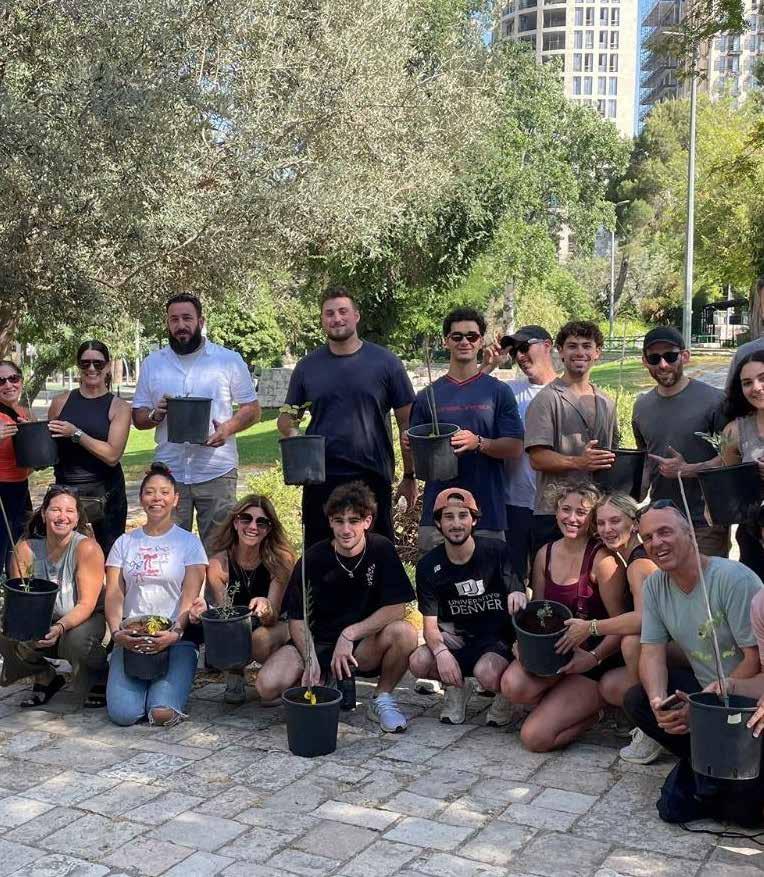





From the premier finishes within our senior residences to the concierge team that recalls your every preference and anticipates your every request, life at Corso Atlanta is enlivened by consistent, tangible luxury.
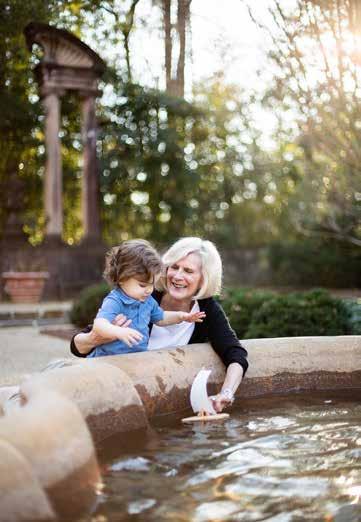

Our concierge-style care services, NoMove Adaptive Care Model, and full suite of wellness amenities and services empower your independence, comfort, and quality of life - now and for years to come.






4 5 6 9 F o u n t a i n D r N E , M a r i e t t a , G A 3 0 0 6 7 Now Available! 4.99% Owner Financing = $1,100+/Month Saved & No Lender





H o m e f o r S a l e
T h i s 6 - b e d r o o m h o m e o f f e r s s p a c i o u s o p e n l i v i n g , a
p r i v a t e y a r d w i t h d e c k s m a d e f o r g a t h e r i n g s , a n d a
s e c o n d k i t c h e n i d e a l l y l o c a t e d n e a r S h u l a n d t h e b e s t
E a s t C o b b s c h o o l s : S o p e C r e e k , D i c k e r s o n , a n d W a l t o n .
R a c h e l L i p s z y c , A s s o c i a t e B r o k e r | A z u r e R e a l t y ( M ) 6 7 8 . 5 9 9 . 5 3 5 8 | ( O ) 6 7 8 . 3 2 9 . 9 9 9 2 r a c h e l @ a z u r e b r o k e r a g e . c o m


Elevate your senior living experience at Heartis Buckhead, where luxury meets tranquility. Unwind in our chic apartment homes and immerse yourself in a community that goes beyond the ordinary. From engaging on-site activities and events to indulgent in resort-style amenities, we prioritize your comfort by offering all essential services, activities, and care in one centralized location. At Heartis Buckhead, we redefine senior living, creating a haven where every moment is tailored to enhance your wellbeing, allowing you to live a luxurious life on your terms.




PUBLISHER
MICHAEL A. MORRIS michael@atljewishtimes.com
EDITOR & MANAGING PUBLISHER
KAYLENE LADINSKY kaylene@atljewishtimes.com
Execuitive Assistant
RONIT FRANCO-PINSKY ronit@atljewishtimes.com
EDITORIAL
Managing Editor
SASHA HELLER sasha@atljewishtimes.com
Staff Writer & Proofreader
FRAN PUTNEY fran@atljewishtimes.com
Interim Online Content Coordinator
ROBERT GARBER robbie@atljewishtimes.com
CONTRIBUTORS THIS ISSUE
BOB BAHR
CHERIE AVIV
DAVE SCHECHTER
DAVID OSTROWSKY
MARCIA CALLER JAFFE
ROBYN SPIZMAN GERSON
SHAINDLE SCHMUCKLER
SUSANNE KATZ KARLICK
ADVERTISING
Senior Account Manager & Team Supervisor
MICHAL BONELL michal@atljewishtimes.com
Account Manager
ILYSSA KLEIN ilyssa@atljewishtimes.com
CREATIVE & DESIGN
Creative Director
LILLI JENNISON lilli@atljewishtimes.com
COMMUNITY ENGAGEMENT
Events Director
JACQUELINE MORRIS jacqueline@atlantajewishlifefoundation.com
Atlanta Jewish Connector Coordinator
DIANA COLE diana@atljewishtimes.com
GENERAL OFFICE
ROBIN FREEDMAN info@atljewishtimes.com 404-883-2130
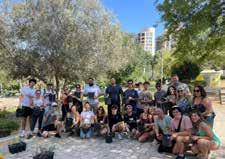



By Sasha Heller
It’s not every day that a random cruise ship captures the attention of the entire world. Then again, it’s not every day that a cruise ship exoduses a warzone carrying more than a thousand young Jewish Americans, who had cut short their Birthright trip while conflict broke out between Israel and Iran.
David Cohen was on that cruise ship and shared a firsthand account of his experiences with the AJT… from the first days of the itinerary, where the program went as expected … to the final days of his, and his Birthright group’s, harrowing escape from a rocket-filled warzone back home to the safe-and-sound shores of America.
Cohen is a 2016 graduate of North Springs, having attended Roswell High School previously where he was a member of the school’s Jewish Student Union from 2013 to 2015. He attended The Davis Academy from kindergarten through third grade and had his bar mitzvah in Tel Aviv. Cohen is a 10-year veteran of Camp Barney Medintz. He graduated from Georgia State University in 2020 with a bachelor’s degree in chemistry. After working for Cobb and Douglas Counties Departments of Public Health during COVID, Cohen went back to school for his master’s in chemistry in January 2021 and graduated in summer 2022.
AJT: What was your original itinerary for the Birthright trip? And how much of that itinerary was your group able to accomplish before the war broke out?
Cohen: We arrived at JFK on Sunday, June 8, and in Israel the morning of the 9th. I had made it a point to not look at the itinerary because I didn’t want any expectations or spoilers into what we were doing. On day one (the 9th), we met our tour guide, our Israeli security guard/medic, and boarded a bus to Ayelet HaShahar -- a kibbutz up north. At our first stop of the day in Yokenam, I had bought a pack of Israeli cigarettes, an apple, and a pastry so I could practice my Hebrew. That night, we went to the pool, ate dinner, and in our activity, we penned letters to our future selves about: a) why we were in Israel? b) what we wanted to learn or gain? c) what do we think will be most impactful? d) how do we identify with Israel?
We never got these letters back. Some of my new friends were late to the activ-
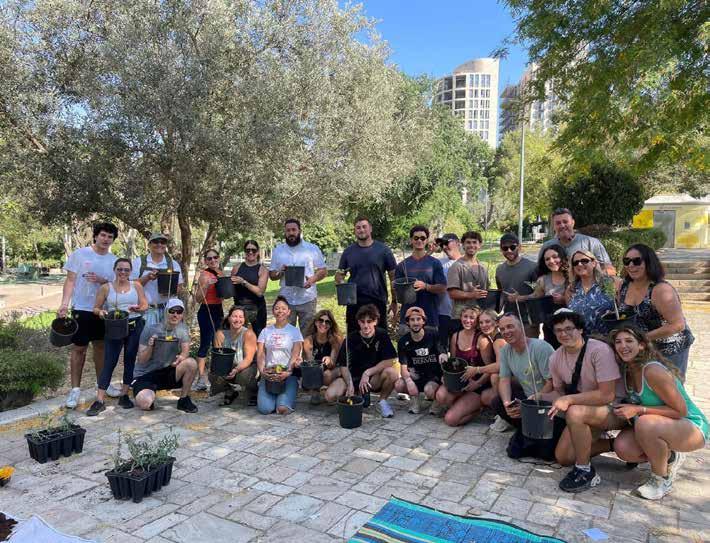
ity because they were playing basketball with some of the local children. After the activity, we were released to go to bed, but almost everyone stayed up to get to know each other better. That night before bed, our trip leader posted a picture of a sign pointing to the bomb shelter just in case we needed to find it. This was funny, because out of 40, only two could actually read the Hebrew. She explained that it was sure to be quiet, but just in case.
Day Two (June 10)
We had our first challenge, a hike of Mt. Arbel. Our tour guide explained that these roads and these paths were the same that had been walked for thousands of years, that Israel was the land bridge between Africa and Asia. It was heavy. He explained that for thousands of years the only freshwater was the Sea of Galilee, and that bandits lived in the caves to raid the caravans. After the hike and after lunch, we went to the Sea of Galilee and tubed behind a boat. It was very fun. That night back at the kibbutz, we again
stayed up late getting to know each other better. The chemistry was palpable.
Day Three (June 11)
We went up into the Golan Heights to Moshav Sha'al and helped an IDF farmer pick apples. At first, we were told we would be doing apricots, and so our Hebrew word of the day was Mish-Mish, which means apricots. We learned a little bit about the history of the area, why it was strategically important for the military and safety of Israel, and we learned a lot about the incredible water usage and technology that allows Israel to be successful in agriculture. We left the farm and went to the Amiad Winery that made wine out of everything except for grapes. Blackberries, espresso, chocolate, you get the idea. A side note -- I have been in recovery and sober for 10 years, so I smelled and gave my drinks away. They gave everyone a good deal on the wines and spirits and liquors, and so people stocked up to bring home to their families. This will become important later.
Once we left the winery and had lunch, we went on a tour of Tzfat, which was incredible. Unfortunately, all the synagogues were closed to us, but we still got a great lecture, and I was lucky enough to corner a rabbi in his art shop and pick his brain about Judaism and the war. For me, it was very powerful. After Tzfat, we went ATV-ing in the mountains, which led to some really funny moments. Back at the kibbutz that night, our activity was cancelled to allow us time to chill.
Day Four (June 12)
We took E-bikes around the Carmel Forest (no serious injuries). Then we met with the Druze in Usfiya to learn about their culture, and finally we drove to Jerusalem and left the north behind. Once we got settled in the hotel, we had a little activity preparing us to get some more Israelis from the IDF to join our group, we had a night out in Jerusalem in the Machne Yehuda Shuk (market). What a wonderful experience that was; to see all the people out and about living happy

and full lives and partying and dancing. Really such a great experience.
Day Five (June 13)
Wow, I just put together right now that all this started on Friday the 13th for the Israel time zone. Wild. We woke up in the middle of the night to our phones screaming at us in Hebrew (which again, none of us can read). Luckily, at the top it said, “Extreme Alert,” in English so we got the gist and headed to the shelter.
I’ll now just summarize everything we did not do using the itinerary as a reference: Old city of Jerusalem (a small group rented bikes and went on Saturday but it was closed); Kotel; Israel Museum; Yad Vashem; Mt. Herzl; Camping and climbing Masada; Dead Sea (except we stayed there as part of our evacuation, we did not do it as a whole group); Nova memorial; Hostages Square; Tel Aviv at all.
AJT: Where were you and your group when the conflict started? Where did you go to stay safe?
Cohen: We were in Jerusalem when the escalation occurred. The first alert came through just about 3 a.m. We had gotten back from the Shuk a couple hours before, and everyone was tired, most people had been drinking. People were really scared, going door to door to wake up those that had not yet risen. No one knew where the shelter actually was. I ended up playing the role of traffic guard at the very bottom of the stairs, directing people to the bathroom, to get water, or finally to the shelter.
I was scared, but I knew the math. The IDF shoots down 99 percent of the incoming, and the ones that get through are aimed at Tel Aviv, not Jerusalem. Even the ones that are aimed at Jerusalem (or that fall short) should be aimed at apartments, not hotels. Even if they miss, I knew we would have to be really unlucky to be hit. At the same time, I carried my emergency medical kit with wound packing, tourniquets, chest seals, 3L of water, and two head lamps everywhere I went just in case. If a rocket did hit our hotel, I knew that if we survived the impact we would surely be buried and up to us to hold out until we could be dug out. I carried that backpack everywhere until we were in Tampa.
All of our programming started happening in the shelter. Our trip leaders scrambled to find us Israeli speakers to come and hang out with us. Our trip leaders were sent from the heavens, truly. They worked so hard to find us speakers and they absolutely nailed it. I often said that I knew our itinerary was scratched because of the war, but they could have fooled me. Rabbi Dov Ber came to our hotel and gave us a little lecture and knocked it out of the park. We got lectures from a married couple in the IDF, from three Orthodox women who made Aliyah, from our geopolitical expert, just to name a few, and they were all excellent.
In the hotel with us was another Taglit trip that was 18-22, and they acted like it. Not talking s*** or anything, but the difference in maturity was very evident. As a result, our trip was allowed to leave the hotel, while they were confined into it. For our trip, the only real rule was to make sure that you were within five minutes of a shelter, and to travel in groups smaller than five. Some of us went to the old city, some went to a famous bridge, others went to different parks and synagogues, all making sure we could find the shelter if needed. We would practice in the morning, "Sleecha, efo miklat?" "Sorry or excuse me, where is the shelter?"
On Sunday night (June 15), we found out we were being bussed to the Dead Sea hotels to muster with a bunch of

The recent attacks have plunged Israel into an unprecedented crisis. Families are displaced, homes destroyed, and the most vulnerable—including Holocaust survivors—are living in terror.
Meir Panim is on the ground, delivering essential meals, supplies, and comfort to those affected. They are exhausted and overextended, but their commitment to providing immediate, tangible aid remains unwavering.
other Taglit trips. I think we were all pretty scared of the bus ride. It’s hard to explain, but we were comfortable in Jerusalem; we knew where the shelter was, we knew the area. We knew where we could go and what was open. When we found out about the bus ride, everyone had the same question, what do we do if the alarms go off while on the bus? The answer did not make us feel good. Get off the bus and into a ditch? Lie down and cover your head? That did not sound appealing. Luckily, we made it to the Dead Sea without incident, but the bus ride was the most tense we had been since the first night of alarms.
I really am struggling to describe what it was like in the shelter during the alarms in Jerusalem. I can break them up into two types. Type one happened when the alarm went off before everyone had gone to bed. Either during Shabbat on Friday night, or during the afternoon. In the type one shelter, it was like a huge party. Everyone was singing and dancing, you had to yell to each other just to have a conversation. Someone broke out an acoustic guitar and played, “Wonderwall,” and, “Take Me Home Country Roads,” and people would drink. I know I made it a huge point to try to breathe life into the party, to make everyone laugh and be comfortable, and to generally raise up the “vibe.” I wasn’t alone in that, but I can’t speak to others’ motivations. I knew that if I slowed down and thought about what was going on that it would be too much, that I would cry or panic and that wasn’t going to do anyone any good. So, I did a combination of giving these negative feelings to G-d and the feelings I couldn’t give I shoved way down and pretended that everything was sababa (our first Hebrew word of the day, meaning, “cool,” which quickly became our Taglit group’s motto).
The type two shelter happened in the middle of the night. Everyone who had been sleeping ran down the stairs the first two nights and stumbled down the stairs the rest of the time. Here, there was no singing or dancing. People slept standing up or lying on the ground or in chairs. Most people talked about anything. Again, I tried to crack jokes and check in on my group, make sure everyone was OK, and no one was panicking. Again, what would panic be good for? I knew we were in one of the safer spots in the country, and if we did get hit, at least I had my supplies and training. I took a Safety Survival and Resilience training/course just in case. I was unique in that my parents had returned from Israel a week before my Taglit trip left, and so I knew a little about the alerts and the safety. My family in Holon does not

go to the shelter when the alarms sound. I realized that our Israeli bus driver did not go to the shelter either, and so I breathed a little easier than most. If it wasn’t bad enough for the Israelis, why would I panic? And yet, when I sat quietly that logic would fail me, so I didn’t dare to sit quietly.
AJT: The world, thanks to social media, saw a clip of the cruise ship to Cyprus. What was the energy like on that voyage?
Cohen: The cruise to Cyprus. That was a [expletive deleted] fever dream. We found out that we were going on a ship (that is all the info we got) from Ashdod to Cyprus at 6 p.m., Monday, June 16. We had to make a decision if we were getting on the ship by 6:30. No one knew anything. People were asking our trip leaders about life jackets, how our safety would be guaranteed, how we were getting home from Cyprus—all perfectly reasonable questions, but these were answers even the people above our leaders didn’t know. I was alone on the balcony of my hotel room when the email came in. I smoked a cigarette quietly thinking about my decision. When our leaders explained that we were either getting on the boat or finding (and paying) for our own ways home, there was not much of a decision to be made. At that point, for levity, I started joking with everyone about taking a 'booze cruise in the Med.' We thought we were going on a barge, or some military ship.
Honestly, being on the cruise was the most scared that I ever was during the
we stopped at their shop and bought delicious fresh squeezed juice. Or the rabbi in Tzfat who owned the art shop that spoke to me about G-d. I was getting out and they were not. I could escape and they could not. This was not what I signed up for Birthright to learn about. And also, it was exactly.
Some of my group saw missiles being intercepted and impacting that night from the deck of the cruise. I fear that if I had been on the deck with them, I would have lost it when they asked if they were heading towards us. The energy on the cruise was insanely positive. It had to be, for if it had not, I feel we all would have been on the deck crying. I knew we weren’t safe yet, so I could not let the facade down. Maybe the younger groups felt differently.
AJT: We heard reports that the planes from Florida did not show up as expected. Is that true? Were you and your group stranded in Cyprus?
evacuation. The email we received the night of June 16 asked us to keep the travel plans private, which I knew no one really did. I didn’t even call my partner off of my phone (I work in the U.S. government) in case my phone was bugged. Crazy, I know. I didn’t tell my parents about the ship until we were in Cyprus. Someone in my Taglit group asked about the Miklat on the ship, where the shelter was if we had a missile alert. We all laughed at him. The reason I was so scared about this boat was because I knew if a missile hit us, we were [expletive deleted]. I didn’t want to swim in the 'Med. My backpack and supplies and training would be useless. I would be helpless. When I voiced that in private, my friends would say that the IDF navy was following us, that Iran would not shoot at us because they would not want to start a war with the U.S. None of that made me feel better. I thought that I would die on the ship. The only thing that made me feel better was to not think.
For me, who is 10 years sober from alcohol and drugs, and in a happy committed relationship, I needed to dance that much harder, as ridiculous as that sounds. I could not handle thinking about sinking to the bottom of the 'Med, nor could I think about getting home and how long that was going to take. I definitely couldn’t think about my family in Holon, or the Israeli children we played basketball with in the north. I could not think about the sweet couple my Taglit group brought to tears because
Cohen: We landed in Cyprus and were split into four groups. My Taglit trip was in group Yellow. To be honest, I really did not care what was happening to us. I was 100 percent focused on keeping the energy high, the vibes good. At the Dead Sea, and probably before then, I fully took on an alternate persona of “Waffle House Guy,” a dumb, overweight, American tourist who wore crazy shirts and a camo Waffle House hat that always had a cig hanging out of his mouth and something stupid to say. I did this specifically to keep everyone in good spirits. I wasn’t paying attention to flights, groups, time, dates, plans, anything.
My bus got to the Cyprus airport at maybe 8 a.m.? I think we got our tickets around 2 p.m. and boarded a flight at 5. Then we were told we couldn’t take off because a document issue with one of the guys on the plane. When the document issue was sorted out two hours later, the pilot then told us that we couldn’t fly anywhere that night because we missed our curfew to refuel somewhere. Some people on our plane just about rioted. At this point, I just didn’t care. I was laughing about how ridiculous this whole thing was. Then we were told that we could take off and we did. This whole ordeal took five hours on the tarmac. The big takeaway was that we knew nothing. Nor did our trip leaders, nor did the higher ups at Taglit. It was an insane situation.
I heard in post that our plane was the only plane to show up. When we were at the gate in Cyprus, we had to take a bus to the plane instead of a normal jetway like we are all used to. While we were waiting
at the gate (for two hours), an email came out explaining that the planes from the U.S. Embassy did not arrive as expected and that they were working on another solution. I didn’t care. I had no choice but to have faith in the Embassy and in Taglit to be taken care of. If that meant staying in the airport for 12 more hours, that’s what it meant. There wasn’t a real alternative for me, so I didn’t care. Eventually, we boarded the bus to get on the plane, and all the worrying about our plane was for naught. When we boarded our plane, it was a s***box. I don’t mean to sound ungrateful, but there were no screens, no Wi-Fi, no chargers. Very different from our cushy El Al flight to Tel Aviv. It mattered to some, but my group didn’t care. What we did care about was that a headrest became detached, and armrest came off. There were ashtrays in the bathrooms. One of my good friends from the trip happened to be an airplane mechanic, and he swore the plane was probably flight worthy. Again, I didn’t care. The pilot wouldn’t fly a crap plane. The U.S. wouldn’t send a crap plane. I was over it. Que sera sera and all that. After the fact, I heard that our plane was the only plane to show up. I heard rumors that people spent the night

at the airport, or at the bus depot, or back on the cruise ship, but I did not verify. I did not care. It didn’t matter to me. Even now I have been completely unplugged from the news, I just can’t handle any of it.
When I was finally alone in the Tampa airport, I broke down before my flight to Atlanta. It was the first time I was re-
ally alone. I was feeling a sense of safety at finally being out of harm’s way, feeling guilty for being safe and having so much fun during the evacuation, feeling like I was away from my family (the others on my Birthright trip) never to be all together again. Also, a huge call to be transformed, as a person, but especially as a Jew. And
wrestling with what that means, was, and is overwhelming. When I got back to my apartment in Georgia, I basically collapsed into bed following a shower. I slept for 15 hours. The next morning, my partner left for work, and I basically cried all day. I did not want to do my laundry because it felt like I was closing the door on this chapter of my life. I know that is stupid. It didn’t matter. Then I popped a fever and have been bedridden since Friday night. I haven’t wanted to talk about it to my friends, for fear they will not get it. I have not felt this alone since I was 15. When I got home, my feet and legs were so swollen from standing and walking that I could not fit into my sandals.
Overall, I would not hesitate for one single second to take this trip over again, exactly the way it worked out. The trip was incredibly impactful and transformative. There have been whispers about our group retaking the exact same trip with the same tour guide and trip leaders in a year from now, G-d willing. I would jump at the chance and opportunity. Even if we don’t go together, I know I will be back. Nothing could keep me from Israel. I have never felt more connected to a place and a land in my life. ì


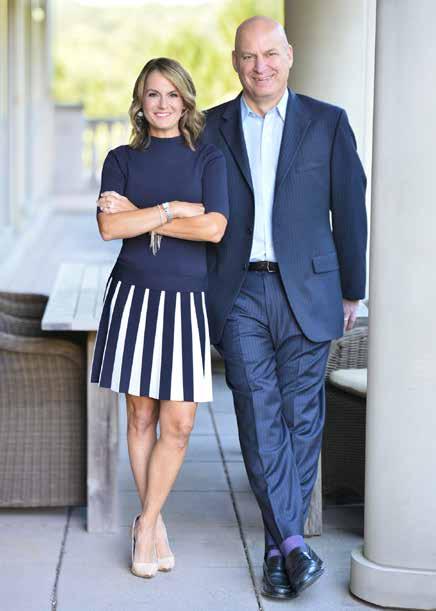
By Bob Bahr
The ups and downs of American diplomacy in the Middle East over the last five decades was the theme of Stuart Eizenstat’s speech at a fundraising event by the supporters of the New Israel Fund (NIF) in Atlanta on June 8.
Eizenstat, who grew up in Atlanta, first went to Washington, D.C., at the age of 34 as President Jimmy Carter’s chief domestic policy advisor. He has served five American presidents during his long career in government service. That evening, he received the New Israel Fund’s Tzedek/Justice Award.
More than 200 guests at Ahavath Achim Synagogue in Buckhead heard him point out that “Israel has never been more secure, never more integrated into the Middle East than it is today.”
He noted that on his trips to Dubai in the United Arab Emirates, he often sees more kippahs, the Jewish head covering, in the Arab capital city than he saw in the audience at the Conservative synagogue where he was speaking.
“In the last five years, since Abraham Accords began, there have been 500,000 Israelis who have visited Dubai and Abu Dhabi,” Eizenstat said, “and I have no doubt that if we were holding this New Israel Fund program in three or four years, that Saudi Arabia will also be part of the Abraham Accords.”
The Abraham Accords, which occurred toward the end of the first Trump Administration, led to peace agreements between the Arab governments of the United Arab Emirates, Bahrain, Morocco, and Sudan. His comments were made on Sunday evening, June 8, just five days before Israel attacked Iran on Friday of that same week.
His optimism about the expansion of the agreements was based in large part on the success of a series of diplomatic agreements that began with the peace negotiations between Israel and Egypt during the Carter Administration in 1978 and 1979 in which he participated. That treaty was followed up by a similar agreement between Israel and Jordan in 1994.
But what he described as the “one bullet that changed the history of the Middle East” was the bullet that killed Prime Minister Yitzhak Rabin in Tel Aviv just over a year later. He was shot by a Jewish Israeli in 1995 who opposed the Oslo Accords. Initially, they had promised a glimmer of hope for some sort of peaceful resolution of the Palestinian question.
“The death of Rabin killed the one

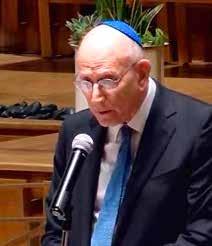
person who was trusted by the Palestinians and trusted by the Israeli public as a former general,” Eizenstat said. “The Israelis trusted him implicitly, not to give away Israel’s security. And Arafat, the Palestinian leader, trusted him as well.”
Today, largely as a result of the attack on Israel by Hamas on Oct. 7, 2023, much of the appetite for an agreement
with the Palestinians has evaporated. A recent public opinion poll by the University of Pennsylvania and the Geocartography Knowledge Group in Israel concluded that 56 percent of those surveyed favored the forced expulsion of Arab citizens of Israel and 82 percent supported the expulsion of Gaza’s Arabs.
“Public opinion has dramatically changed since Oct. 7,” Eizenstat told his New Israel Fund audience. “I frankly think that as close as all of us feel to Israel, we cannot appreciate what a shock and trauma Oct. 7 has been to the Israeli public.”
A dozen years ago, he pointed out, 61 percent of Israelis favored a two-state solution. Today, only about 25 percent are in favor of a separate Palestinian state.
Among that dwindling number are the supporters of the New Israel Fund, which honored the Washington insider. Since its founding in 1979, the NIF has distributed $345 million to 950 organizations working with Jews and Arabs in Israel.
The NIF’s national head of fundraising, Alex Willick, opened the evening
by saying that, “Oct. 7 tested the limits of everything NIF stand for, in terms of building a shared society,” and in its opposition to the policies of the present government of Israel.
“NIF is there to support the thinkers, the doers, the shakers, the future leaders of the pro-democratic camp that give me so much hope. We are there to speak the truth to power, to speak this truth in the streets.”
Willick said the organization is funding emergency civil rights work and underwriting legal action in the courts to support what he described as “the basic infrastructure of democracy and coexistence.”
In short, he emphasized that, “We’re making sure that somebody is out there planting the seeds of peace. This is not abstract work. It’s immediate, it’s measurable, it’s brave.”
For Eizenstat, too, the next steps Israel takes, particularly in Gaza, where the war has continued for 18 months, needs to be clear and measurable.
“Wars have to have an ending. They all do. And the question is, what do you end it with?” ì
The following is a roundup of developing stories related to Israel’s ongoing conflict with Iran:
U.S. President Donald Trump announced last week that the U.S. had carried out a “successful attack” on the Fordo, Natanz and Isfahan nuclear sites in Iran, hours after he appeared to suggest that the matter of U.S. involvement in Israel’s campaign against Iran’s nuclear program was as yet undecided.

The decision to directly involve the U.S. in the war came after more than a week of strikes by Israel that damaged Iran’s nuclear facilities, eradicated the country’s air defenses, and took out many of its military brass and top nuclear scientists. Iran, in retaliation, has launched dozens of ballistic missile barrages at Israel.
“A full payload of BOMBS was dropped on the primary site, Fordo,” Trump wrote on Truth Social, referring to the difficult-to-destroy underground site, which has been characterized as the most integral part of the Islamic Republic’s nuclear program.
“All planes are now outside of Iran air space [and are]… safely on their way home,” he wrote. “Congratulations to our great American Warriors. There is not another military in the World that could have done this.”
“NOW IS THE TIME FOR PEACE!” Trump added.
He then shared a post from an open-source intelligence account claiming that “Fordo is gone.”
“Our objective was the destruction of Iran’s nuclear enrichment capacity and a stop to the nuclear threat posed by the world’s number one state sponsor of terror,” Trump said.
“Tonight, I can report to the world that the strikes were a spectacular military success,” he said. “Iran’s key nuclear enrichment facilities have been completely and totally obliterated.”
For full story, visit Atlantajewishtimes.com/us-enters-iran-israel-conflict-targetsnuclear-sites/
Iran fired a barrage of some 30 ballistic missiles last week, scoring a direct hit on Israel’s main southern hospital, the Soroka Medical Center, and two other impacts in the central cities of Holon and Ramat Gan that wounded dozens of people, including six in serious condition.

The Magen David Adom emergency service said that a man, 80, and two women, both in their 70s, were among six people seriously hurt. Two people were moderately injured, and at least 42 others suffered light injuries from shock waves and shrapnel at the various impact sites. In addition, 18 people were lightly injured as they scrambled to bomb shelters when sirens went off.
The barrage was the latest from Iran as it bombards Israel with ballistic missiles. Israel began attacking Iranian nuclear and military sites last week, citing the immediate existential threat they pose.
For full story, visit Atlantajewishtimes.com/heavy-damage-injuries-as-missile-hitsbeersheba-hospital/
Israel killed a senior Iranian general last week, just days after eliminating his predecessor, the Israel Defense Forces said Tuesday morning, as the campaign against Iran’s nuclear program and Iran’s retaliatory missile barrages at Israel entered their fifth day.
Israel launched its campaign early Friday, asserting an imminent existential threat from the regime’s nuclear and ballistic missile programs.

Explosions and air defense fire were reported in Tehran. Air defenses were reportedly also activated in Natanz, home to a major uranium enrichment plant that was seriously damaged in Israel’s opening attack, and satellite images showed extensive damage at a missile base.
An airstrike Monday night killed Maj. Gen. Ali Shadmani, the new head of the Khatam-al Anbiya Central Headquarters, also known as Iran’s military emergency command. He had only been on the job for some four days, having replaced Maj. Gen. Gholam Ali Rashid, who was killed on Friday in Israel’s opening strikes against Iran.
The IDF said Shadmani was de facto Iran’s most senior military commander, the “war chief of staff,” and was considered the closest remaining military figure to Iran’s Supreme Leader Ali Khamenei.
Shadmani “commanded both the [Islamic Revolutionary Guards Corps] and the Iranian Armed Forces” amid the conflict, the IDF said.
For full story, visit Atlantajewishtimes.com/israel-kills-irans-new-war-chief-asstrikes-continue/
Israeli airlines El Al, Arkia and Israir have been given the green light to prepare for operating repatriation flights to start bringing back the more than 100,000 Israelis stranded abroad.
Following the approval of the Transportation Ministry and aviation authorities, El Al will pick up Israelis from Larnaca in Cyprus, Athens in Greece, Rome and Milan in Italy, and Paris in France.

Passengers for these flights have already been assigned. Those who hold a valid El Al or Sun Dor flight ticket to Israel, and whose flights were canceled after the country’s airspace was closed, are eligible for an emergency flight at no additional cost, El Al said.
For full story, visit Atlantajewishtimes.com/israel-plans-to-bring-home-100k-citizens-stuck-abroad/

Israeli security and rescue forces at the scene of a ballistic missile strike from Iran in Bat Yam, June 15, 2025 // Photo Credit: Avshalom Sassoni/ Flash90/Times of Israel
Compiled by AJT Staff
By Robert Garber
Since October of last year, Atlanta Jewish Times has been operating on a new model: making subscriptions for home delivery completely free and asking instead that subscribers donate as much or as little as they want. AJT owner and publisher Michael Morris described the impetus for that change in an article written that month.
“The newspaper industry, like all printed media, is changing. Online news is commanding a larger share of viewer experience, the cost of paper, printing and distribution is rising significantly, and advertising dollars cannot quite cover the cost of creating a physical newspaper,” he said. “The bottom line, in order to produce the quality product the community currently enjoys, the AJT needs to raise additional funds to cover the gap between advertising sales and total expenses. The most effective way to entice new donors is to make the donation tax-deductible. Thus far, since I have owned the paper, I have funded this gap personally.”

There have been some significant updates since the switch to the new mod-


el. Perhaps most impressive, the average donation has been around $78, significantly higher than the $65 subscription
cost of the prior model. There has also been an average of more than 50 donations a month.

“Whether or not someone chooses home delivery or picks the paper up at our distribution locations, any donation ensures the distribution to the entire community,” Morris said.
All donations will be made to the Atlanta Jewish Life Foundation, a 501c(3) nonprofit entity that supports a large portion of the AJT’s annual budget. Readers will receive an annual email notification that encourages donating to help support distribution costs.
In addition to the new model, Morris recently noted the creation of new community events, and the associated Atlanta Jewish Life Foundation, as more sources of income in line with the Atlanta Jewish Times' goals as a community paper.
“To meet economic goals, many periodicals are creating new revenue streams and one of these new streams is community events,” Morris said, in a letter sent out to readers this month. “This is half the reason that the AJT created the new
Atlanta Jewish Life Festival and has taken over the Kosher BBQ Festival from the Hebrew Order of David. The other reason is to further the paper’s mission of Keeping Jewish Atlanta Connected. Both events bring thousands of community members together for a family fun day.”
Morris continued, “The Atlanta Jewish Times is celebrating 100 years of continuous publication. In my opinion, it is still a valuable asset to the community providing unique content, written by local community members, about local community members, organizations and events, for every demographic of the local Jewish community. I trust you see the benefits the paper has given the community over the past century and are willing to meet with me to support the paper for the next generation.”
If you’d like to get free home delivery, or are already getting free home delivery but feel inspired to make a donation, please visit https://atlantajewishlifefoundation.com/ ì

•
“home
• Each time she visits, she
• She can’t wait to redecorate your
especially that hideous wallpaper you chose.
• She thinks there is no good reason money earmarked for your children shouldn’t be spent

By Sasha Heller
Good news! The Atlanta Kosher BBQ Festival is back … even though, technically, it never left.
This year’s festival is set for 12 p.m. to 4 p.m., Nov. 9, at Brook Run Park. Admission is free and open to the entire community.
The Atlanta Jewish Life Foundation has assumed administrative duties from the Hebrew Order of David, which has organized the festival for the last 11 years since the event’s inception. Jacqueline Morris, events director for Atlanta Jewish Times, will manage operations for the festival going forward.
Morris is no stranger to the Kosher BBQ Festival.
“The last two years of the festival, I hosted a cookoff team,” Morris said. “Unlike other teams, we were not sponsored through an organization, we were just young adults having fun. Last year, I wasn’t even living in Georgia at the time, but I flew in to host a team.”
Morris added that the Kosher BBQ
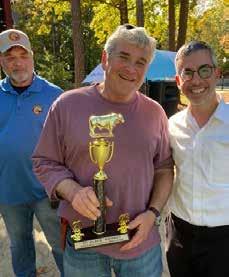

Festival is one of her favorite Jewishthemed festivals because “you are free to be out and Jewish, you feel safe. Even after Oct. 7, we all felt safe.”
Jody Pollack, the festival’s previous

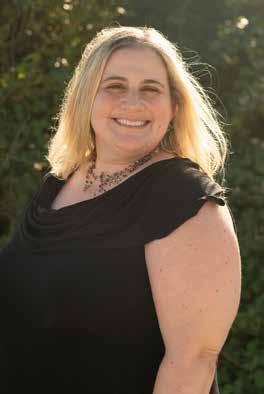
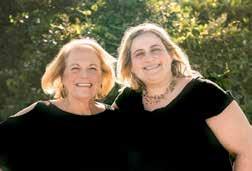
executive director, organized the event for more than a decade and, after last year’s festival, he decided he was ready to pass the torch.
“I had to do a lot of soul searching
before stepping down. For the past 10plus years, this has been an integral part of who I was, and I am now in a phase of my life where I need to refocus my efforts and priorities,” he said in an interview last fall.
As with previous iterations, this year’s festival will feature the BBQ competition including best chili, brisket, chicken and beef ribs categories, BBQ tasting, team contests, kids’ zone, community expo, live music, and a silent auction.
“The Kosher BBQ Festival is the only standard Jewish festival in Atlanta that hosts 4,000 people, from Orthodox to Reform and even non-Jews who are just supportive of us being who we are.”
And we are, collectively, Jews who love a good BBQ.
Team and vendor registration are now open. To register, please visit www. TheAtlantaKosherBBQ.com, or email jacqueline@atlantajewishlifefoundation. com. For more info, please call 770-2653803.
Brook Run Park is located at 4770 North Peachtree Road in Dunwoody. ì





Wellness-Forward Senior Residences
A residential wellness retreat amidst Atlanta’s finest neighborhood - Village Park Milton’s brand new luxury residences feature a suite of new wellness amenities and services. As a fully licensed residence, we offer discrete wellness services that empower your independence And from our floral boutique and full service salon to our bar and restaurant lounges, you’ll be met with an unparalleled standard of hospitality and intention.

Call today for availability on Milton’s most coveted senior residences.


By Marcia Caller Jaffe
It’s been an exciting spring for Dunwoody’s Congregation Ariel, which celebrated in May its three-plus decade anniversary and the renaming of the Beis Midrash in honor of Rabbi Binyomin and Morah Dena Freidman.
Concurrently after a global, 18-month search, the congregation hired Rabbi Pinchas Fink to succeed founding Rabbi Friedman, who is retiring at the end of July after more than 30 years of service. Synagogue President Josh Bakhshi, stated, “Rabbi Fink was chosen from over 20 applicants. He got high marks and enthusiasm from across our culturally and religiously diverse community, which includes Torah scholars, those who are newly observant and those who have always been so, Russian speaking, South African, Israeli and other Sephardic Jews. That we achieved 85 percent consensus among these groups is a blessing we did not expect. That is a tribute to Rabbi Fink.”
Prior to officially launching the
search, the search committee co-chairs, Steve Mendel and Elaine Brasch, conducted “listening” sessions with the membership to understand what the community was seeking in future rabbinic leadership. In addition to prior experience, the community wanted a kind, empathetic listener with demonstrated ability to provide pastoral care, advice and guidance for challenging life situations who was also energetic, charismatic with a high emotional IQ and uncompromising Torah practice and acumen. A tall order!
Also high on the congregation’s list was to continue the Friedmans’ legacy of being a non-judgmental, vibrant and welcoming home for all Jews in Dunwoody while remaining true to Torah and Jewish law.
“Rabbi Fink checked all our boxes. We are confident that he will take our established community to the next level,” said Brasch.
Mendel told the AJT that “the search committee really got to know Rabbi Fink over the last few months. He impressed us not only with his background and ex-
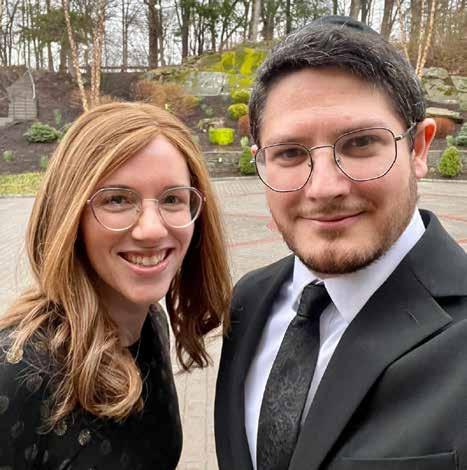
Congregation Ariel’s congregants and the search committee felt that Rabbi Pinchas and Naomi Fink were the practical and soulful choice.





perience, but his soft spoken, kind and gentle demeanor. He has the vision and passion to work together to inspire and strengthen our community. He is also an enthusiastic educator and has professional training in marriage and mental health counseling. It became clear to us early in the search process that Rabbi Fink was a strong contender.”
Rebbetzin Dena Friedman, affectionately known as “Morah” Dena, partnered with Rabbi Friedman to build the Ariel community from the ground up. Alyson Lembeck, a member of the search committee, related, “Morah Dena is not replaceable, but we are so excited that Rabbi Fink’s wife, Naomi, who shares many of Morah Dena’s qualities, is so willing to support her husband’s efforts, lead women’s events, teach and counsel women all while pursuing her impressive career.”
Currently, Naomi Fink is a manager of new product development for Tiffany and Co. at Pelham Productions. She has a B.S. in mechanical engineering from Rutgers University and a master’s in applied statistics from Penn State University.
Lembeck continued, “She will be an incredible role model to our women and daughters.”
Both Rabbi and Rebbetzin Fink grew
up in Highland Park, N.J., where their families are long-time friends. Rabbi Fink studied in Yeshivas in Wisconsin, New Jersey, and ultimately, in the Chofetz Chaim Yeshiva, spending 10 years learning in the Beis Medrash and Kollel and ultimately received his Semicha (rabbinic ordination). He began his rabbinic career while in Chofetz Chaim serving as a rabbinic intern at the Jewish Heritage Center, and then as interim rabbi at Kesser Torah, both in Queens, N.Y.
He currently serves as the rabbi of the Mount Kisco Hebrew Congregation in Mount Kisco, N.Y. Rabbi Fink also holds a B.A. in history from Touro College. The Finks are the proud parents of Danny (11), Laya (7), and Tzviki (5) who will attend Torah Day School in the fall.
Rabbi Fink said, “We are privileged to follow in the visionary footsteps of the Friedmans, whose leadership and dedication shaped Ariel into the vibrant community it is today. As we look ahead, we are excited to lead Ariel into its next chapter. Ariel is a shul and a community that we feel truly blessed to be part of, and we are confident that it will continue to grow, thrive, and inspire.”
The Finks plan to arrive in Atlanta early in August. ì











By Cherie Aviv
Hearts were filled with joy as Holocaust survivors were honored with their families, volunteers, and guests at a joyful Holocaust Survivor Day on Monday, June 9, to celebrate survivors’ strength and resilience. Holocaust Survivor Day, now an annual event in its fifth year, has celebrations happening locally, nationally, and globally.
Approximately 180 people, including 59 survivors and their family members, gathered for a special program, followed by entertainment by the City Springs Theatre Conservatory students and lunch. The Atlanta event was hosted by the Holocaust Survivor Support Fund (HSSF) convened by Jewish Federation of Greater Atlanta.
Cherie Aviv, founder and chair of HSSF, noted, “As you look at our generous sponsors of Holocaust Survivor Day, I am so proud to be part of a community where we have many organizations that work to care for survivors, educate the community about the Holocaust, and provide commemoration. The day was a celebration of survivors and our Jewish community working together.”
Holocaust Survivor Day was graciously sponsored by Seed the Dream Foundation, Jewish Federation of Greater Atlanta, Jewish Family & Career Services, The Breman Museum, Eternal LifeHemshech, Am Yisrael Chai/The Daffodil Project, Georgia Commission on the Holocaust, Jewish HomeLife, Marcus Jewish Community Center of Atlanta, Congregation B’nai Torah, Specialized Printing, and Cherie and Gary Aviv.
Ronnie Zandman shared, “The event was a magnificent acknowledgement of survivors and what they teach us about starting over, rebuilding lives, and forging new paths. With all the turmoil in the world, it was a moment to be uplifting, to see the smiles on the guests’ faces, and be encouraged by the talent of the amazing high school students who performed.”
Aviv emceed the event, with speakers Rich Walter, chief impact officer of Jewish Federation, and Terri Bonoff, CEO of JF&CS. There was also a video highlighting survivors in many special events and programs throughout the year whether cultural, social programs, or celebrating Jewish holidays.
Walter, in his remarks, noted, “We celebrate the survivors and also their caregivers for all they do. I also want to thank the survivors who have documented their story playing a critical role
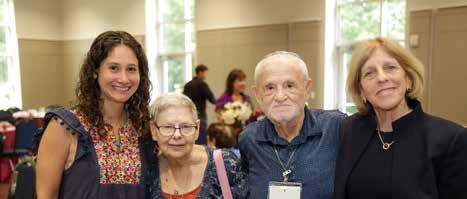
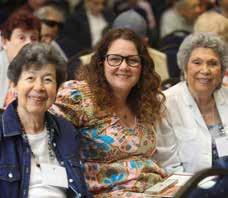

in helping future generations to understand the danger of hate and antisemitism as well as instilling a sense of pride and perseverance in the Jewish future.”
Bonoff added, “At JF&CS, providing care to Holocaust survivors is core to our mission and vision to transform lives and help people live to their full potential. We are honored to partner with HSSF in this endeavor and be committed long-term to care for survivors in Atlanta and in the Southeast region. The survivors are part of our family, and we are here today in celebration of them. We are inspired by their courage and resilience. Their spirits shine a bright light for us all.”
There were special rounds of applause for two survivors, Ruth, celebrating her 100th birthday this year, and a survivor who will be celebrating his 101st birthday. Hershel was recognized for his trip this past April, as a Holocaust survivor, on the March of the Living program.
Samantha Paulen, granddaughter of a Holocaust survivor said, “The moment was so special for me to see survivors honored and cared for. As a granddaughter of a survivor, it was truly heartwarming.” Marie, a survivor said, “It was wonderful to connect with children and grandchildren of survivors, in attendance, keeping our history alive together through the generation.”
“I was deeply moved by the warmth
of the kindness in everyone’s hearts, and the lovely songs that carried the spirit of the celebration,” said Nusya, another survivor. “Every detail, even the lovely lunch, made me feel seen and cherished. It was a truly unforgettable and touching day — one I will hold close to my heart.”
Inna Lyubimova, JF&CS case manager, noted, “The survivors truly loved the gathering. It made them feel surrounded by warmth and kindness. Some survivors rarely get the chance to leave home or spend time with friends. This day was precious and unforgettable.”
Natalie DeLancey, executive director of City Springs Theatre Company, arranged for the Conservatory students from the upcoming cast of “Footloose” to perform. The conservatory provides training for young people in the performing arts. For this event, the inspiring performers included Trevor “TJay” Groce, Elizabeth Hall, Symone Muñoz, Kennedy Johnson, Dakota Youngblood, Roger Wang, and pianist Judy Cole. They sang a variety of songs.
Yakov, a survivor, said, “It was so meaningful and uplifting to see young and talented people on stage, paying tribute to Holocaust survivors.” And Marina, a family member, added, “It was also so wonderful to speak with the performers afterwards.”
“My mother would not have missed
today’s event,” said family member Susan Berman. “She felt energized, loved, and adored. These events allow her to socialize and enjoy special moments such as these phenomenal talented singers. “
The Holocaust Survivor Support Fund convened by Jewish Federation of Greater Atlanta, was created to work with primary partners JF&CS and Jewish HomeLife and community partners (The Breman Museum, Eternal life-Hemshech, MJCCA).
JF&CS is a social service agency that works directly with survivors to provide care for survivors with funds from the Claims Conference. Yet these funds are unable to meet all the needs of survivors. The Holocaust Survivor Support Fund, through support from generous donors, helps make up for the shortfall in funding from the Claims Conference, and to help survivors with needs such as homecare, prescription assistance, dental care, emergency financial assistance, home-delivered meals, food assistance, adult day care, residential care and more.
In 2024, HSSF funds helped 169 Holocaust survivors in Georgia and provided 514 touchpoints across all service areas (with duplicates). To learn more about the Holocaust Survivor Support Fund or to donate, to help support survivors in need in their final years, please visit www.jewishatlanta.org/HSSF.
By Bob Bahr
The University of Haifa in Israel recently facilitated a discussion in English by Ran Kuttner, who runs the university’s program in international peace and conflict management. For several years, he has also taught at Creighton University and was a visiting scholar at Harvard University’s Law School and in Israel.
Of all the universities there, the one in Haifa is perhaps best situated to be the home for such a program in understanding and dealing with conflict. Fifty percent of its students are from families that have never had a college graduate among them. Forty percent of the students are from Arab Israeli families, and the university has a student population that is among the most diverse in the country.
Oct. 7, but it’s now amplified, and also those rifts between those with differing visions of how Israel’s society should be governed.
The schisms between Jews and Arab citizens, according to Herscher, have widened since Oct. 7 in Israel. This fragmentation of Israeli society, he pointed out, not only weakens Israeli society from within, but it also impacts critical national priorities, many of which will be raised today, including strategies for ending the war and securing the safe return of hostages.
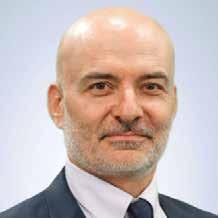

the rest, we’re hugging each other in tears, and they know that they have what it takes to deal and to manage and contain and to engage constructively with these difficult issues. And I think that’s more important.
Its campus sits atop Mount Carmel on the Carmel Ridge and is surrounded by villages and smaller towns whose populations represent many different faith and social and economic backgrounds. It has offered the university a unique opportunity to train future generations in the skills of conflict resolution that can help Israel manage both its relationships with other nations and relationships among its own citizens.
Facilitating the online discussion with Dr. Kuttner was Gideon Herscher, vice president of the University of Haifa. They talked about healing from within, rebuilding Israel social fabric after Oct. 7.
Herscher prefaced the discussion by saying that Israel today faces profound internal divisions that threaten its social fabric and its national resilience. The aftermath of Oct. 7 he believes has intensified preexisting fractures between religious and secular communities, which we saw prior to
In discussing how Israel can best heal itself internally in the years ahead, Dr. Kuttner said that the first step may be for the country to come in with a mindset where they reserve judgment and try to shy away from heated political discussion in which they take sides, saying who’s right and who’s wrong. His further remarks have been edited for space and clarity.
“I think part of what I would like to say is that we need to be able to observe and embrace and be mindful of the complexities at hand. And in order to do that, we need to take a step back from passionate advocacy towards one side or another.

“I was hosting a discussion among 15 Israeli Army members, friends since the age of 18, and now they’re 65 or 66. They called me in saying, ‘We can’t handle our relationship anymore.’ And you know, friends coming out of the Army, you know what kind of bonding that is, they say we’re unable to maintain and contain our relationships. Do come and help us.
“We were sitting there for three hours. There were two people at the end that were a bit frustrated, saying we didn’t say anything about why Bibi is good or Bibi is bad. I said that’s not the point. All
“We need to find ways to empathize, empathize in the classical term of kind of getting into the shoes of the other, going into the home of the other, and seeing the inner logic that there is over there. I keep on saying, there is an inner logic that we need to be able to be to attend to.
“I remember being in Colorado
mountains, and I remember a person telling me he used to help hikers in the summer, and he told then if you get lost on the mountains, first thing you need to do is to sit down. Don’t try to find a way out, just sit down. Take a deep breath, count to 10. Do something constructive as we count to 10 of taking the other person into account, so that we can get to a more complex perspective that allows us to embrace the differences. Work on finding a third way, a new way, a new compassionate narrative.” ì






By Marcia Caller Jaffe
June 12 ushered in The Buckhead Shul’s first Jewish Business Network (JBN), a night of education and inspiration.
Jason Chaliff, founder and managing director of Rise Property and Denali Investment Group, along with Josh Ahlzedeh, managing director of development and leasing for Delza Properties, representing the “up and comers,” were in conversation with experienced real estate macher Jan Saperstein, president of Southeastern Asset Management Group.
Josh Feldberg kicked off the JBN concept by relating how Jews wandering in the desert were therefore “good at real estate.” Saperstein was introduced as a University of Georgia grad and self-made “titan” associated with blue chip retail brands like Chick-fil-A, Home Depot, and PetSmart. In 1990, he founded his asset management group focusing on ownership, development, syndication, and management of retail centers. Saperstein began his career with Ackerman & Co.
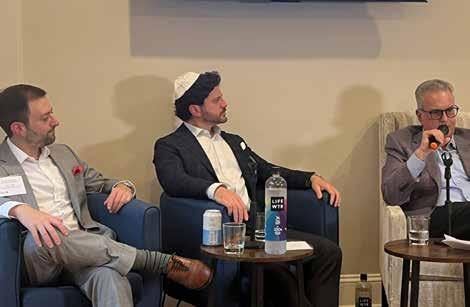
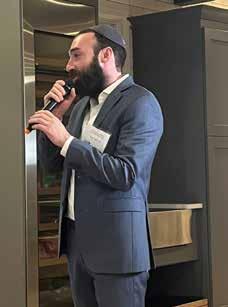
in retail site selection and commercial leasing. His portfolio includes tenants like Target, Trader Joe’s, CVS, Kroger, HomeGoods, and Starbucks.
Chaliff and Ahlzedeh peppered

Saperstein with well-prepared questions ranging from weathering business cycles, tenant mix, and trends. Saperstein started by explaining that raising funds and finding money takes a back seat to finding the right real estate.
“Break the code and find what value you bring, then the funds will come … tenants come and go. It’s all about the land. Real estate is scarce … female customers are ultimately what make the world go round … that’s why Home Depot and Lowe’s lowered their shelves.”
Ahlzedeh urged Saperstein to talk about what he learned from Chick-fil-A’s founders who realized that owning and leasing back to the franchisee was the “golden ticket.” Saperstein recalled in 1980 that they came out of the malls to a location at Briarcliff and North Druid Hills. “The lease was $35,000 a year. They made that in 10 days.”
Chaliff asked about trends and the matrix for growth. Saperstein noted that the cost of doing business in Atlanta has gotten so expensive that he is looking at LaGrange, Austell, Hinesville, even Dahlonega, where the Publix is on the side of a mountain. In terms of property tax and bureaucracy, Saperstein has used tax incentives as an offset buy, but cautioned, “Don’t buy tenants or financing. Buy real estate with or without tax incentives.”
Chaliff queried Saperstein about what excites him about the real estate profession. “It’s really a cerebral chase, like Rubik’s cube. I moved away from development because it is a massive pain in the a--.”
Chaliff asked what route Saperstein would have pursued had he not chosen commercial real estate. Saperstein re-
lated that his mother, a bank secretary, told him that five or six of the largest depositors were in commercial real estate … then he said “Well, I like fly fishing but …” Ahlzedeh asked Saperstein to talk about the action in layers, where the money lies. “The $30 to 40 million range is where the herd thins out -- more opportunities. Get out of being beholden to ‘mom-and-pop’ tenants … Hobby Lobby may have challenges and issues, but they are going to stay in business.”
Onto some retrospection, Saperstein laughed at a deal he turned down with a tenant, Snake Museum. “Know when to sell to leverage funds to buy more stable properties.” Then, he reminisced about his role in Sandy Springs Plaza recalling that they had bathrooms in the basement in 1958 for “colored” people. Later, in a genius move, he got Trader Joe’s into that center. Chaliff noted that his own favorite deal was with owners/debtors who “have to sell.”
Rabbi Israel New closed the meeting noting the success of this first JBN event and to stay tuned for more. He thanked Saperstein and shared how their initial meeting was a Zoom call when Rabbi New realized that he (Jan) “was a man of the people, down to earth and started with Yiddish roots.”
The Buckhead Shul is part of the Chabad Buckhead and Brookhaven, located at 133 E. Wesley Road The Buckhead Shul will hold a pickleball tournament at Bitsy Grant from 10 a.m. to 2 p.m., June 29, with light refreshments. Entry is $35 per couple, OR $20 per individual. For more information and to RSVP, please visit info@theshul.org. ì
By Marcia Caller Jaffe
With eyes glued to news stories involving mission persons, cold cases, or searching for bodies in a lake, enter Jewish canine expert John Anthony Shahor, who operates LED Law Enforcement Dogs for the 21st Century.
Redemption Road Canines is an innovative training model that merges canine science, forensic methodology, and trauma-informed practices in active field investigations.
Shahor stated, “Redemption Road K9 wasn’t born in a boardroom — it was born in the mud. I sketched the business plan on a yellow legal pad in L.A. after being told I wasn’t cut out for dog training. I’d been volunteering and working with dogs around the city when I realized the company I needed didn’t exist. I didn’t grow up with dogs, so I approached the craft methodically — reverse-engineering how many dogs I needed to work with weekly to hit 10,000 hours in five years. I drew inspiration from Seattle’s best customer service brands, aiming to deliver that same consistency in dog training.”
They’ve supported missing person cases, cold cases, gravesite searches, and scent detection missions. In a recent Lake Oconee case, his dogs joined an interagency search. Later, one of his dogs found a suicidal man in time to save his life. Most recently, he participated in Operation Lost Trails – The Search for Justice, a collaborative missing persons search in Macon. Agencies involved included the Georgia Bureau of Investigations (GBI), Twiggs County Sheriff’s Department, the Dublin Judicial Circuit DA, GA-CERT K9, and the La Sierra University Criminal Justice Department. The mission doubled as field training for Shahor’s criminal justice students enrolled as registered apprenticeship participants.
This story has multiple levels of interest as Shahor, who is a practicing Jew, is the son of a Black father and Jewish mother. Sometimes to his chagrin, Shahor or his children are passed over and judged based on appearance. He explained, “I grew up in Seattle, Wash., in the Seward Park neighborhood, the Central District, Ballard and Wedgwood — places known for having vibrant African American and Jewish communities. These rich cultural roots shaped who I am. My mother was born in The Bronx. Though we weren’t observant, we were deeply spiritual.”

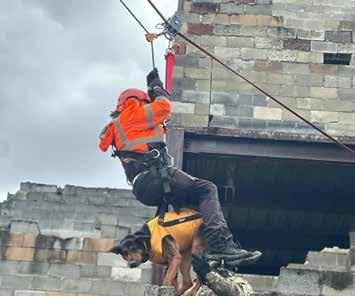
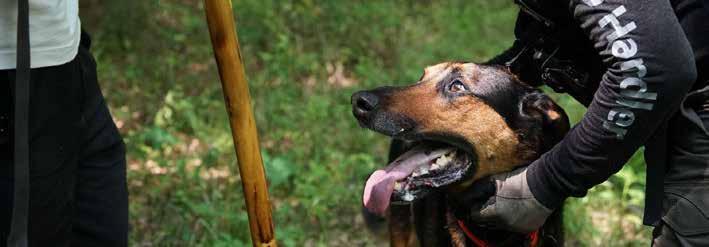
Shohar consults with police departments across Georgia, Alabama, Tennessee, California, and Washington, though not all partnerships can be disclosed. He supports K9 peak performance in nutrition, injury rehab, Reiki, tracking, trailing, aggression training, and more. He is also a certified decoy but doesn’t “take bites” for every agency. His Law Enforcement Dogs for the 21st Century Program, featured in La Sierra University’s Criminal Justice Department, reflects the six pillars of 21st-century policing, including community trust, oversight, technology, and officer wellness. Courses include: Dogs & Drones Tactical Integration; Compassionate Policing for the 21st Century; and Tactical K9 First Aid.
Shohar is also known for his prison work with Pawsitive Pathways Program, a trauma-informed initiative teaching incarcerated participants canine care,
animal-assisted intervention, and workforce skills as part of the U.S. Department of Labor Registered Apprenticeship Program.
Certifications offered: Tactical K9 First Aid & CPR; K9 Nutrition & Wellness; Kennel Operations; and AAI-21 Fundamentals.
For Tikkun Olam, Shohar deepened his Jewish observance by developing Mitzvot and Mutts, a guide to integrating dog ownership into traditional Jewish life. He’s inspired by Proverbs 12:10, “A righteous person cares for the needs of their animal.”
Here are five foundational dog training principles grounded in his Jewish values:
* Lead with Kindness (Tza’ar Ba’alei Chayim) – Like mitzvot approached with love, dogs respond best to compassionate leadership.
* Establish Structure – Dogs thrive on routine, just as we do with Shabbat, prayer, and kashrut.
* Use Clear Communication – Most “bad” behavior stems from confusion; training is a dialogue.
* Respect the Bond – Like our spiritual practices, the human-dog bond must be nurtured with intention.
* Embrace Growth Together – Just as we aim to elevate ourselves spiritually, training is mutual transformation. Shohar also does private client training on all breeds (specializing in working dogs like Malinois and Shepherds), hiking groups, therapy dog certification, and urban public access sessions. For pet suitability, they guide families on breed compatibility, especially for high-drive or sensitive dogs. And even an occasional cat, mostly for integration with dogs. ì
Torah Day School of Atlanta (TDSA) has engaged in a year-long study of the character trait of kindness as part of their core values program. The Chessed Continuum – an exhibit that included multi-media presentations from every grade from kindergarten through eighth – which was held on May 27, was a culmination of this study. It was a truly impactful presentation of how chessed (kindness) is an important part of who Jews are as a people.
TDSA’s core values curriculum encompasses seven critical character traits teaching students to care for one another, engage respectfully, and contribute to the greater community. At a time when the world is more divided than ever and our fellow Jews worldwide are under attack, it felt critical to embrace the themes of kindness and unity – two of the pillars of this program. These values were woven through the school curriculum through a multi-disciplinary approach. Students learned that chessed (kindness) means to step outside of ourselves and work to build up our communities. Achdut (unity) focuses on our commonalities. Together, these ethics help Jews appreciate the individuality of their neighbors, be responsible for their well-being, and embrace all those around them as extensions of ourselves.
At the Chessed Continuum, the outcomes of this year-long study were on display. Students were asked to reflect on Jewish history as a whole and examine how chessed is baked into every aspect of the Jewish nation. The Chessed Continuum transformed Torah Day School’s gym and the surrounding hallways into an enormous, interactive museum with each class contributing exhibits relating to the material they had learned this year. It was a truly multidisciplinary event, blending ideas from the Torah with critical reading and math skills gained in the school’s general studies classes. This event was spearheaded by TDSA’s Charlie Lewis, Irina Pelishev, and Rabbi Avi Rubin who helped students express their concepts of chessed meaningfully and tangibly.
The exhibits traced the path from creation all the way to modern times and demonstrated how the values of kindness and unity are inherent in the Jewish experience every step of the way. Some truly impressive displays were put together by the students and the staff. The second grade created a replica of the matriarch Sarah’s tent, and the fourth graders put together a scale recreation of the streets of the lower east side. In one of the hall-


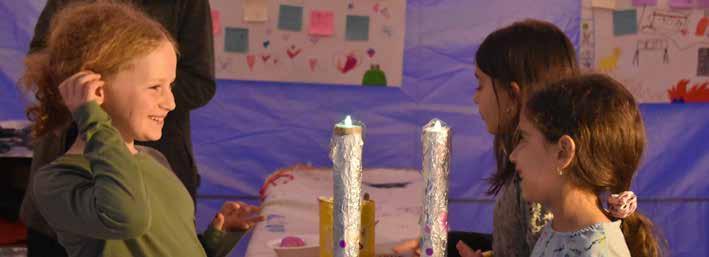
ways, the first graders and kindergarten students reconstructed the experience of leaving Egypt and crossing the Red Sea with a giant walk-through display. This led into a depiction of the kindness G-d showed the Jews during their wandering through the desert with a life-size model of the Jewish camp in the desert.
In all of these displays, the students connected these historical figures, places and events with the kindness that took place or that these individuals showed. The students used the content they learned all year in the Torah, Talmud, history, and science and combined it with research, writing (in both Judaic and general studies) and mathematics skills to create moving and relatable exhibits for everyone to experience and explore.
The final portion of the program was entitled: Chessed in Exile. In this section, students from all grade levels delved into real, lived acts of kindness being performed daily in the here and now. The students looked into the various ways the Atlanta community and Jewish com-
munities all over show kindness to one another and demonstrate unity. There were displays sharing amazing acts of kindness including the rescue of Ethiopian Jews, support for Ukrainian refugees, and the formidable aid provided by many organizations in the wake of the Oct. 7 attacks in Israel. The eighth grade explored acts of kindness during the Holocaust, framed through the poem, “The Butterfly,” by Pavel Friedman. Their exhibit traced the path of Jews through the ghettos to concentration camps. Along the way, they highlighted the personal stories of young teens who experienced and survived the Holocaust and the chessed they encountered along the way that made their survival possible.
The Chessed Continuum was a formidable undertaking on the part of administrators, teachers, students, and support staff all over the school. Torah Day School came together to create something uplifting and relevant in today’s fractured world. One of the most important takeaways of the Chessed Continu-
um was the application of chessed in our daily lives. Almost every exhibit incorporated practical suggestions for improving our acts of kindness towards others.
“The goal of the Chessed Continuum was to make the ideals of chessed (kindness) and achdut (Unity) tangible to the students,” says Head of School Rabbi Meir Cohen. “Throughout the school year, from kindergarten to eighth grade, students were immersed in the study of chessed. As their study progressed, we saw them initiate new acts of kindness among their peers, for the faculty and staff. Working together to create their exhibits for the Chessed Continuum and experiencing the exhibits the other classes put together, we see that they have truly internalized these values. This is just the beginning– and I feel confident they will carry and build upon these lessons as they mature. This is a program that will stay with them and will impact the rest of their lives.” ì
Compiled by AJT Staff
combining technology and artistry to create exceptional dentistry. As a comprehensive dental office that goes above and beyond our specialty in Cosmetic Dentistry, our patients believe Dr. David Mastro is the right choice for all your family dentistry needs!
When it comes to your smile and oral health, Dr. Mastro has a proven 30 year track record of providing quality cosmetic and family dental care for families in our local community and around the world.

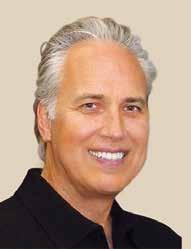





In the aftermath of the Oct. 7 terrorist attacks, the global response has been heartfelt and historic: in 20 months, Israel Bonds has raised more than $5 billion in global investments for the State of Israel, more than doubling what the organization typically raised in this time
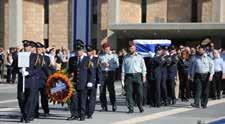
June 30, 2012: Israel’s seventh prime minister, Yitzhak Shamir, dies at 96. Born in Poland during World War I, he made aliyah in 1935. He joined the Irgun, then the Stern Gang. He was first elected to the Knesset in 1973.
July 1, 1244: Frederick II, the duke of Austria, issues a charter extending rights to Jews to boost the economy. The charter serves as a model for medieval Europe. It remains in effect until Austria expels its Jews in 1420.
July 2, 2011: Uri Dvir, a founder of Shvil Yisrael (the Israel National Trail), dies at 80 in Tel Aviv, his birthplace. He planned and initiated the 620-mile hiking path from Kibbutz Dan near Lebanon to Eilat on the Red Sea.
July 3, 1982: The First International Conference and Festival of Jewish Theater, a five-day gathering, opens in Tel Aviv even though many Israeli participants have been called up for military duty during the First Lebanon War.
frame during the recent years prior to 2023.
This extraordinary milestone reflects an outpouring of support from individuals, institutions and local governments who chose to act and stand with Israel. It marks the strongest sustained sales momentum in the organization’s 74-year history.
“Oct. 7 changed everything,” says Dani Naveh, president and CEO of Israel Bonds. “But what followed has been nothing short of extraordinary. I initiated a special campaign of support for Israel on that horrific day, and mobilized our great professional team, with the support of our leadership. I take pride in managing Israel Bonds to record-breaking achievements at Israel’s critical time of need. Every dollar invested in Israel Bonds sends a message of hope, and unwavering belief in Israel’s strength and future. This $5 billion isn’t just capital, it is a global vote of confidence in the Israeli economy.”
Compiled by AJT Staff

Israelis rejoice while awaiting the arrival of the rescued Entebbe hostages at Ben Gurion Airport on July 4, 1976.
// By Ya’acov Sa’ar, Israeli Government Press Office, CC BY-SA 3.0
July 4, 1976: Israeli commandos storm the airport in Entebbe, Uganda, to rescue 106 hostages from a hijacked Air France flight. All seven terrorists, 20 Ugandan soldiers, three hostages and one Israeli soldier (Yoni Netanyahu) are killed.
July 5, 1979: Israel National Opera Company founder and star Edis De Philippe dies at 67 after brain surgery. She made aliyah in 1945, and the Zionist Congress in December 1946 approved her plan to launch the opera company.
July 6, 1989: A Palestinian Islamic Jihad terrorist seizes a bus from Tel Aviv as it passes a ravine outside Jerusalem and steers it over a cliff. Sixteen people, including one American and two Canadians, are killed, and 17 others are injured.
July 7, 1969: U.N. Secretary-General U Thant says he is considering withdrawing U.N. observers from the Suez Canal zone because of “open warfare” there. Egypt and Israel have shot across the canal daily for three months.

Magen David Adom’s Blood Services announced that 271,036 blood units were donated in Israel over the past year //
David Adom
Magen David Adom’s (MDA) Blood Services announced that 271,036 blood units were donated in Israel over the past year (June 14, 2024, to June 11, 2025), helping save the lives of hundreds of thousands of patients, including the injured and women in childbirth.
July 8, 1958: Politician Tzipi Livni is born in Tel Aviv. She is first elected to the Knesset in 1999 with Likud. In the 2009 election she leads Kadima to the most seats but can’t form a government. She creates the Hatnua party in 2012.
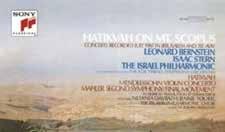
“Hatikvah on Mount Scopus,” the CBS recording of the Jerusalem unification concert July 9, 1967, became a bestselling album worldwide.
July 9, 1967: Leonard Bernstein conducts the Israel Philharmonic Orchestra on Mount Scopus to celebrate the cultural unification of Jerusalem after the June 1967 war. The concert features Mahler’s “Second Symphony.”
July 10, 1895: Nahum Goldmann, a founder of the World Jewish Congress and the Conference of Presidents of Major American Jewish Organizations, is born in Lithuania. Starting in 1935, he lobbies for the partition of Palestine.
July 11, 1920: Rebecca Sieff, Vera Weizmann and Edith Eder found the Women’s International Zionist Organization at a London conference. WIZO aims to provide child care, housing, schooling and other services in Palestine.
Of these donations, 65.2 percent came from men (176,905) and 34.8 percent from women (94,131). Approximately 16 percent of donors (43,739 people) were first-time blood donors.
Due to the “Iron Swords” War, there has been increased use of whole blood units — especially Type O whole blood that contains all blood components and specialized antibodies. These units are critical in emergencies and have saved thousands of lives. MDA supplied 12,750 such units to hospitals and the IDF over the past year.
Lior Altman, director of MDA’s National Blood Donation Program, said, “Thanks to the dedication of Israeli citizens — civilians and soldiers — we can meet the demand for blood for patients, the injured, and women in labor. We thank every donor who took time to save lives. Blood can be donated every three months, and we invite the public to continue this vital life-saving mission.”
Compiled by AJT Staff
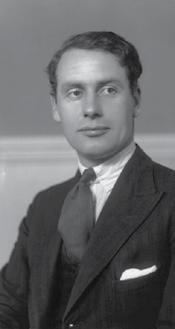
Malcolm MacDonald represented a British government policy of showing increasing favor toward Arabs. // By Bassano Ltd., British National Portrait Gallery, public domain
July 12, 1938: Chaim Weizmann complains to Malcolm MacDonald, the British secretary of state for dominion affairs, about the official shift from support for Zionism to a pro-Arab policy in the year since the Peel Commission’s call for partition.
July 13, 1978: Egyptian President Anwar Sadat invites Israeli Foreign Minister Ezer Weizman to a meeting in Austria to press for a bilateral peace agreement. Sadat says Israel must withdraw from Sinai, Gaza and the West Bank.
July 14, 1958: Iraqi army officers overthrow and kill King Faisal. The Egyptian-Syrian union quickly signs a defense pact with the new Iraqi government, and Israel faces the danger of being surrounded by a Nasserled multinational entity.
Items are provided by the Center for Israel Education (israeled.org), where you can find more details.

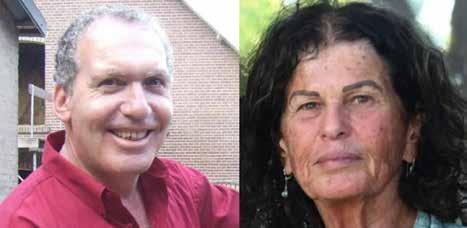
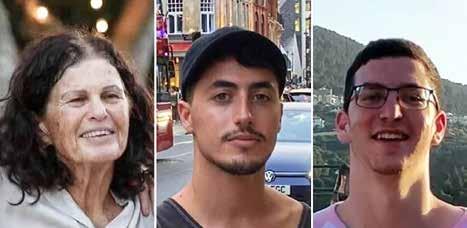

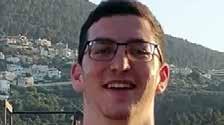
By TOI and Agencies
The bodies of three slain hostages, Ofra Keidar, Jonathan Samerano, and Staff Sgt. Shay Levinson, were recovered in a joint military and Shin Bet operation from the Gaza Strip, the IDF announced.
The operation to recover the bodies was carried out by the Gaza Divisin, and was “enabled by precise intelligence” obtained by the military’s Hostages Headquarters unit, the Military Intelligence Directorate and the Shin Bet, the IDF said.
The three bodies were brought to Israel for identification at the Abu Kabir forensic institute, after which their families were notified.
Keidar, 71, was murdered by Hamasled terrorists while on an early morning walk near her home in Kibbutz Be’eri during the Oct. 7, 2023, onslaught. Her body was then abducted to Gaza.
The slain kibbutznik was remembered by friends and family as a lover of exercise who always took her daily morning walk, loved gardening, swimming and animals — and worked for decades on the kibbutz’s dairy farm, milking cows.
Keidar’s husband, Sami Keidar, was killed by Hamas terrorists on the sofa in his home, according to relatives. Suffering from Parkinson’s, he was unable to reach the family’s safe room in time. His caregiver was also wounded by Hamas
gunfire.
Samerano, 22, who lived in Tel Aviv, was attending the Nova music festival when the Hamas onslaught began. That morning, he fled the rave to Be’eri with two friends, where they were murdered and his body abducted. More than 360 people were killed at the rave.
Footage from kibbutz security cameras captured Hamas terrorists loading him into a Jeep and driving toward Gaza. His death was confirmed in December 2023.
The slain hostage’s father, Kobi Samerano, said that his son’s body was recovered on what would have been his son’s 23rd Hebrew birthday.
“Yesterday was Yonati’s Hebrew birthday. On his 23rd birthday, on the very day he was born, our Yonati was rescued in a heroic operation by the brave soldiers of the IDF and the Shin Bet,” Kobi Samerano wrote on Instagram, using a diminutive of his full name.
Levinson, 19, was a tank commander stationed on the Gaza border on the morning of the onslaught. He was killed while battling the invading Hamas terrorists near the Nova rave, and his body was abducted to the Strip.
A resident of Givat Avni, a small northern community near Tiberias, Levinson was described as an excellent student, kindhearted and sociable. He played volleyball in Israel’s top league for Eilabun, a nearby Arab town. ì
The following is an index of Israeli hostages with the most current information available as of press deadline.
The first phase of Israeli hostage transfers is complete. The Atlanta Jewish Times will update this hostage tracker with current news of the next round of hostage transfers. Bring Them Home.
Israeli hostages remaining:
Fifty-five more hostages are held in Gaza by Hamas and Islamic Jihad terrorists. The hostages are:
Rom Braslavski, 21
Yosef-Chaim Ohana, 24
Nimrod Cohen, 20
Matan Angrest, 22
Ziv Berman, 27
Gali Berman, 27
Maxim Herkin, 36
Segev Kalfon, 27
Bipin Joshi, 24
Elkana Bohbut, 35
Alon Ohel, 24
Ariel Cunio, 27
Bar Kupershtien, 23
Guy Gilboa-Dalal, 23
Eitan Horn, 38
Tamir Nimrodi, 20
Matan Zangauker, 25
Avinatan Or, 31
Omri Miran, 47
Eitan Mor, 24
David Cunio, 34
Eyvatar David, 24
The following hostages are either believed to be dead or their deaths have been confimed:
Amiram Cooper, 84 (murdered in captivity)
Inbar Hayman, 27 (murdered in captivity)
Asaf Hamami, 41 (murdered in captivity)
Eliyahu Margalit, 75 (murdered in captivity)
Uriel Baruch, 35 (murdered in captivity)
Tal Haimi, 41 (murdered in captivity)
Oz Daniel, 19 (murdered in captivity)
Tamir Adar, 38 (murdered in captivity)
Eitan Levy, 52 (murdered in captivity)
Ran Gvili, 24 (murdered in captivity)
Yair Yaakov, 59 (murdered in captivity)
Ronen Engel, 54 (murdered in captivity)
Sahar Baruch, 35 (murdered in captivity)
Itay Chen, 19 (murdered in captivity)
Aviv Atzili, 49 (murdered in captivity)
Dror Or, 48 (murdered in captivity)
Muhammad Al-Atrash, 39 (murdered in captivity)
Joshua Loitu Mollel, 21 (murdered in captivity)
Idan Shitvi, 28 (murdered in captivity)
Yossi Sharabi, 53 (murdered in captivity)
Arie Zalmanovich, 85 (murdered in captivity)
Daniel Peretz, 22 (murdered in captivity)
Guy Illouz, 26 (murdered in captivity)
Lior Rudaeff, 61 (murdered in captivity)
Meny Godard, 73 (murdered in captivity)
Ilan Weiss, 56 (murdered in captivity)
Hadar Goldin, 23 (murdered in 2014)
Omer Neutra, 21 (murdered in captivity)
Sonthaya Oakkharasri (murdered in captivity)
Sudthisak Rinthalak (murdered in captivity)
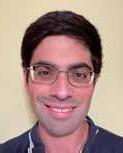
David Ostrowsky
In less than three weeks, Truist Park will be the hub of the baseball universe when it hosts the 95th edition of the Major League Baseball AllStar Game on the evening of Tuesday, July 15. Though single-admission tickets for the Midsummer Classic, the first one in Atlanta since 2000, are still hovering around $500 on the secondary market — while those for the July 14 Home Run Derby are currently going for $350 — baseball fans will have ample opportunities to enjoy both affordable and free activities throughout the weeklong festivities during which more than 100,000 visitors will stream into Atlanta.
Capital One All-Star Village, which is essentially a baseball theme park for fans of all ages, will be running throughout All-Star week at Cobb Galleria Centre, just steps from Truist Park and The Battery Atlanta. From July 12-15, fans can enjoy this splendid baseball carnival — chock-full of All-Star Game merchandise and food items from local eateries — that showcases dozens of interactive and educational attractions including a curated exhibit from the National Baseball Hall of Fame & Museum, an interactive display from the Negro Leagues Baseball Museum, and a Women in Baseball exhibit.
Included in the price of the $35-perperson admission to Capital One All-Star Village is the chance to get autographs and have photos taken with many former baseball legends. This year’s deep roster naturally has strong Atlanta roots with J.D. Drew, Ron Gant, Marquis Grissom, Tim Hudson, Andruw Jones, Ryan Klesko, Fred McGriff, Javy Lopez, Dale Murphy, Terry Pendleton, and Mark Wohlers all slated to attend. There will even be a Jewish presence at All-Star Village as Jason Marquis, who pitched for the Braves in the early 2000s, is scheduled to appear. Additionally, former softball stars and MLB Youth Ambassadors will be on hand to coach children through different clinics and games. The All-Star Village promises to entertain even very young kids as the mascots from every MLB club — not just Blooper — will be running through the Cobb Galleria Centre to meet and greet fans.

After hosting many postseason games in its short history, Truist Park will serve as the backdrop to Major League Baseball’s crown jewel event, the All-Star Game, on Tuesday, July 15.
“Offering a wide array of attractions during MLB All-Star Week, including our iconic mascots, legendary Hall of Famers and more, we are excited to bring a cherished event to the heart of Atlanta, where fans can enjoy all aspects of the game and celebrate being a part of baseball’s rich heritage and vibrant community,” shared Jeremiah Yolkut, MLB senior vice president, global events.
Also of note, MLB and the Braves are partnering with KultureCity to ensure that All-Star Village offers a sensory inclusive environment. There will be a specially designed sensory space while sensory bags containing noise-canceling headphones, fidget tools, a feelings thermometer, and other calming mechanisms will also be available.
“Capital One All-Star Village gives everyone the opportunity to experience the excitement of MLB All Star Week in Atlanta,” said Jim Smith, Atlanta Braves senior vice president of business strategy. “Located walking distance from Truist Park and The Battery Atlanta, the Cobb Galleria Centre is being completely transformed to host this unique event, and we can’t wait to welcome visitors from around the globe to this one-of-akind environment.”
Tickets for All-Star Village — as well as all other All-Star events — are available at AllStarGame.com.
As for the events themselves, the AllStar Red Carpet Show will take place at 2 p.m. on July 15, in The Battery Atlanta. In what has become a marquee feature of All-Star Week over the past couple decades, hours before the Midsummer Classic, the 2025 MLB All-Stars and their families will parade down a custom carpet spanning 700 feet along Battery Avenue and into Truist Park’s right field gate. While the Red Carpet Show is free of charge, space is limited and fans are encouraged to register on AllStarGame. com for an opportunity to attend the show up close.
Another admission-free event is the opening night of the 2025 MLB Draft, which is scheduled for 6 p.m. on Sunday, July 13. Taking place at the Coca-Cola Roxy in The Battery Atlanta, the evening’s festivities will showcase the first 40 draft selections in conjunction with guest appearances by past players and mascots, giveaways, and live player interviews.
In the days preceding the Home Run Derby and All-Star Game, there are less expensive events held within the confines of Truist Park. Ken Griffey Jr.’s HBCU Swingman Classic (Friday, July 11 at 7 p.m.) will provide a platform for top players from Historically Black Colleges and Universities (HBCU) across America to display their talents while being man-
aged by former Braves David Justice and Brian Jordan. The next afternoon, Truist Park will host the annual All-Star Futures Game and All-Star Celebrity Softball Game. The former will feature Chipper Jones and Grissom as honorary managers of the American League and National League squads while the headliners for the latter exhibition include Olympic gold medal gymnast Jordan Chiles, Atlanta native rapper, singer, and entrepreneur, Quavo, and soon-to-be Baseball Hall of Famer C.C. Sabathia, among others. Tickets for All-Star Saturday include access to both events with gates opening at 1 p.m.
All-Star Week is anticipated to generate an economic impact amounting to more than $50 million for Atlanta. While scores of local businesses will reap the economic benefits, the Braves and MLB, through the MLB Together initiative, will donate over $4 million towards community-based projects designed to enhance access to fields for youth baseball and softball players across the city as well as to support veterans and provide sustainable food and farming resources to underserved communities. In addition, during All-Star Week a new sensory space will be opening at Truist Park for those with neurodivergent and sensory needs and their loved ones to use during ballpark activities. ì
By David Ostrowsky
As children growing up three miles apart in Pittsburgh in the 1960s, Chuck Greenberg and Mark Cuban attended the same synagogue, Temple Emanuel of South Hills. Coincidentally, a half century later in 2010, the two Steel City natives and lifelong friends found themselves in a bidding war for the Texas Rangers, which Greenberg ultimately won by compiling an ownership group that put up $593 million. Though Greenberg’s run as managing partner and chief executive officer of the Rangers was short-lived as he cut ties with the franchise in March 2011, a year later, his son, Jeff, an alum of University of Pennsylvania and Columbia Law School, continued the family tradition of working in baseball by landing an internship in the Chicago Cubs baseball operations department.
Working under Jewish executives Theo Epstein and Jed Hoyer, who in 2016 would shepherd the star-crossed Cubs franchise to their first World Series title in 108 years, Greenberg shot up the ranks of the Cubs’ front office to eventually become an assistant general manager. After taking a brief hiatus from baseball by joining the crosstown Chicago Blackhawks of the NHL where he applied his data analytical skills for another sport’s player personnel matters, Greenberg was hired as the Detroit Tigers’ general manager in September 2023. Since then, the surging Tigers have gone from perennial also-rans in the American League Central to being the unexpected odds-on favorites to win their first World Series since 1984.
In an era when playing deep into October seemingly hinges on shelling out the most money to free agents in December, the Tigers, who last season pushed the Cleveland Guardians to Game 5 of the American League Division Series, appear to be the exception. With a $156.2 million payroll — the 19th-ranked payroll for tax purposes and less than half of what the top-ranked Los Angeles Dodgers are spending at $405.4 million — the Tigers currently have the best record in baseball and the largest division lead of any club. No team has come close to doing more with less and Greenberg, as one of the stewards of Detroit’s cost-effective roster, stands as the latest baseball operations executive whose reliance on spreadsheets has transitioned to postseason berths.
When asked to explain the Tigers’ unexpected fast start during an interview last month with 97.1 The Ticket, the

Tigers’ flagship radio station, Greenberg, who of course has the perfect surname for his post as Jewish Hall of Fame first baseman Hank Greenberg played nearly his entire career in Detroit, reasoned, “We’ve gotten really good starting pitching. One through five, we feel like every night we have a starter on the mound who’s going to give us a chance to win. Our bullpen has been really steady throughout, multiple guys who can finish out a game, multiple guys who can match up with different pockets of the opponent’s lineup. And as an offense, we’ve gotten on base, we’ve hit for damage, and we have versatility and depth.”
For the first time in nearly a decade, the Tigers are expected to be serious potential buyers at next month’s trade deadline (July 31). Aside from their lefty ace pitcher, the remarkable Tarik Skubal, the Tigers aren’t exactly stacked with household names — they just missed out on landing star Jewish third baseman Alex Bregman during free agency — and questions remain as to whether this run of success from a lineup of overachievers can be sustainable all summer long.
“We can’t lose sight of the fact that our biggest improvements are going to come internally, like we’ve seen so far,” noted Greenberg. “We have a young team full of players who have made a ton of
progress. That progress isn’t always going to be linear, but that needs to continue to be our focus. That’s the reason why we are where we are right now.”
For small-market teams such as Detroit that often are unable to re-sign their impending free agents and/or pay enough for current ones, the pathway to sustainable success is developing and replenishing a robust pipeline of young talent. Under the mentorship of Epstein and Hoyer, Greenberg excelled in this regard for the Cubs as he developed keen scouting strategies and data systems in the Cubs’ buildup to their 2016 World Series title before presiding over longterm player transactions and daily roster moves.
Another way that cash-strapped clubs have outperformed big-market teams this century is by subscribing to the “Moneyball” philosophy of leveraging data analytics to uncover the most overlooked — and thus least expensive — talent on the market. As a true “Moneyball” acolyte who relies on statistical information rather than high-level playing experience to make baseball operations decisions, Greenberg has joined the ranks of other Jewish baseball executives such as David Stearns, Chaim Bloom, Mark Shapiro, Jon Daniels, Epstein, and Hoyer who have had varying degrees of success with
their data-intensive approach.
“I went to law school knowing I wanted to try to work in baseball,” Greenberg remarked in a 2022 story for the Columbia Law School website. “I was lucky enough to get two summer internships for the Pittsburgh Pirates when I was an undergrad, and it took me, like, three days to realize, ‘This is what I want to do.’ This was in 2006, and … ‘Moneyball’ had been published a few years before. There were all these new ideas out there; Theo Epstein had won a World Series in Boston by incorporating a data analytics approach to managing the Red Sox. So, it felt like there could be opportunities for individuals like me, who didn’t necessarily play professional baseball, in a team’s front office. But it also felt like having legal training and that analytical skill set could be really useful.”
Indeed, one of the most profound changes to baseball in the 21st century has been many teams embracing a mindset grounded in quantitative reasoning that was rather taboo and considered wildly unconventional before it was popularized in a New York Times bestseller and later on the big screen. And it would certainly appear that Greenberg’s Tigers, poised to play in their second consecutive postseason, are a strong beneficiary of said development. ì
By Marcia Caller Jaffe
Wendi and Jason Aspes are riding the big wave in tandem with the popularity of pickleball to debut a line of clothing, Wringer Wear, five years in the making. Wendi Aspes was an avid tennis player who constantly battled the Atlanta heat and wanted apparel that helped her perform better.
Necessity is the mother of invention, and when Jason and Wendi took up pickleball, lobbing through the humid Atlanta summers, they got to work creating Wringer Wear, a cutting-edge pickleball apparel brand “designed by players, for players whose mission it is to enhance on-court performance through innovative clothing solutions.”
Jason Aspes is also the president of the UPA-A, the regulatory body that governs professional pickleball. Wendi Aspes is married to Jason’s brother Adam Aspes.
With patented DRYV technology, their apparel features dual-layer performance fabric that pulls moisture away


and absorbs it quickly -- like a towel built right into the clothes to ensure dry hands and a secure grip during intense matches.
Wendi explained, “Our playercentric design means every product is crafted with the question, ‘Will this help us play better?’ guiding our development




process. We want stylish performance: beyond functionality, our designs ensure players look as good off the court as they perform on it.”
With goods manufactured in China, Wringer Wear has proprietary wipe zones on both skirts and shorts that are designed to be easily accessible and al-

In terms of expanding the product line into paddles, balls, and equipment, Wendi doesn’t rule that out. “We are focused on apparel that can improve your game and keep you looking and playing your best. If we can design and build a new product that can serve that mission, we might pursue it.”
Wringer Wear is available in selected clubs and stores around the country. Wendi concluded, “Pickleball is a community sport. It’s grassroots and in the spirit of the sport, we are doing our best to reach players on all courts. We go to lots of events and tournaments and sell directly from our website www.wringewear.com. “
Jason grew up in Sandy Springs and went to Riverwood High School onto The University of Florida. Wendi grew up in New Jersey and graduated from Colgate University. She met Jason’s brother, Adam, in New York City after college, then moved to Atlanta in 2006. Jason plays at a high competitive level (4.5), while Wendi is a 3.5-level player. Keeping pickleball in the family, Adam and nephew, Shai, recently medaled in the ATL PPA Slam Tournament. They are members of The Temple and Wendi is on the board of National Council of Jewish Women. Watch for Taylor (Wendi’s youngest) celebrate her bat mitzvah in November. Wendi exclaimed, “Possible pickleball theme!” ì
Nothing will improve your game more than drilling. If you can find a partner that is as ambitious and dedicated, there is no better way to improve quickly. Find a great teacher who can identify opportunities to improve your game. It’s amazing how much the right guidance can help.
Twenty Hadassah Greater Atlanta (HGA) PRIMEtime members joined with members of The Sandwich Project on May 21 to help meet food scarcity in Metro Atlanta.
The Sandwich Project is a nonprofit organization whose volunteers assemble and donate fresh, homemade sandwiches each week for immediate consumption to meet the shortage of food needs in Metro Atlanta. Each HGA PRIMEtime volunteer arrived prepared to work with their own food supply to make peanut butter and jelly sandwiches with two loaves of store packaged white bread, one large jar of strawberry or grape jelly, one large jar of peanut butter, and 20 plastic sandwich bags.
The sandwich prep was set up in an assembly line. Hair tied back, gloves on and laughter everywhere made this event a party! Women traveled up to 30 miles to join us in this mitzvah. This event was chaired by Linda Glovsky and Amy Mittelberg, new members of Hadassah Greater Atlanta whose journey began with attending their first HGA
PRIMEtime Greater Atlanta program.
A new member of Hadassah, who signed up directly after the event, transported the prepared food to its destination. Michele Weiner-Merbaum, HGA PRIMEtime Chair explains, “HGA PRIMEtime events are for women in the 50s and 60s who wish to engage with and support Hadassah, the Woman’s Zionist Organization of America. Our passionate community is 300,000 strong individuals, united behind our powerful mission of healing the world.”
Simone Wilker, advocacy chair for Hadassah Southeastern Region, states, “HGA PRIMEtime members, working to prepare these 250 sandwiches, wanted to recognize American Jewish Heritage Month by assisting their local community, while ensuring that Hadassah’s healing reaches people who need it most.”
Hadassah is looking to engage women within the 50- to 60-year-old demographic who are seeking to connect with likeminded women who want to become involved in something larger
By Bob Bahr
Antonin Bergeaud has been named the Best Young Economist in France for 2025. The award is made annually by Le Monde, one of France’s leading newspapers, and the Cercle des économistes, a group of leading French economists.
He is the son of Martine Tartour, who is married to Yoel Levi, the principal conductor and music director of the Haifa Symphony Orchestra. For 12 years, he held the same position with the Atlanta Symphony Orchestra. Tartour is a prominent French journalist who has been a contributor to Atlanta Jewish Times. She hosts the Ciné Club French Film Series here several times each year. Both Tartour and Levi are residents of Atlanta.
The Young Economist Prize each year honors a young French researcher under the age of 40 whose work is noted for its academic excellence and the contribution it makes to the public understanding of economic ideas.
Bergeaud’s research focuses primarily on the impact of artificial intelligence on the working environment, which has been among the most discussed issues in today’s business world.
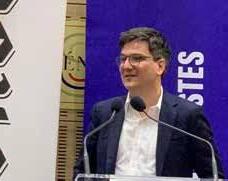
Antonin Bergeaud has been named the Best Young Economist in France for 2025.
The prestigious award recognizes the innovative nature of his research, as well as its relevance in understanding the challenges facing today’s labor market.
The LeMonde Best Young Economist Prize, which has been awarded for the past 26 years, acknowledges research that has particular importance in advancing the design or evaluation of public policies, informing business strategy, or helping the general public better grasp key economic issues.
Bergeaud is associate professor at HEC Paris, which is a leading business education program in France. He received his PhD in 2018 from the Paris School of Economics. He lives in Paris.

than themselves. For more information, contact Michele Weiner-Merbaum at
mweiner-merbaum@hadassah.org. Compiled by AJT Staff
Thank you for Voting for us!

We offer Personal Care and Companion Care services to help your loved one feel connected and stay comfortable at home.
Personal Care
• Bathing and grooming
• Continence and bathroom assistance
• Ambulation and mobility
• Transferring and positioning
• Meal planning and preparation
• Walking and exercise
• Reminders of medication, events
• Other personalized services


Companion Care
• Meal planning and preparation
• Walking and exercise
• Reminders of medication, events, birthdays and more
• Other personalized services
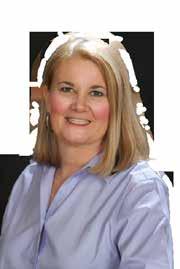
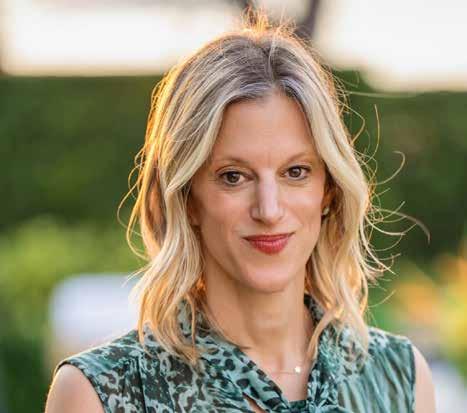
Kate Smith has been promoted to the role of Vice President, Southeast Region for Birthright Israel Foundation.
Kate Smith has been promoted to the role of Vice President, Southeast Region for Birthright Israel Foundation. She achieved great success in Atlanta, working with National Board Member Doug Ross and local leaders to build a model community others now look to.
Birthright Israel’s mission is to provide all young Jewish adults with opportunities for transformative and immer-
sive shared experiences in Israel and a foundation for ongoing Jewish connection. To invest in Birthright Israel and help ignite a lasting spark of Jewish identity and pride that can transform lives, strengthen communities, and build a vibrant future for the Jewish people, please visit www.birthrightisrael.foundation.
Compiled by AJT Staff
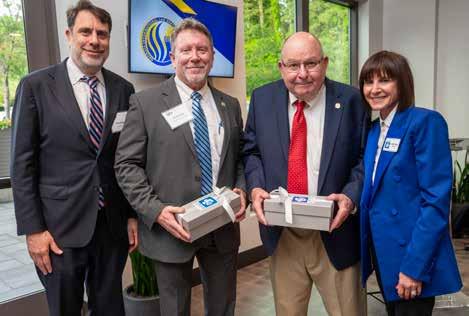
The White Rose Society partnered with the Georgia International Law Enforcement Exchange (GILEE) to honor two distinguished law enforcement leaders: former Georgia Bureau of Investigation (GBI) Director Vernon Keenan and current GBI Director Chris Hosey.
Linda Selig, founder of The White Rose Society, presented each of them with a White Rose in recognition of their steadfast professional support for the State of Israel and the Jewish people. Rabbi Peter Berg, Senior Rabbi of The Temple, offered a special blessing to both men in tribute to their leadership and commitment. Many law enforcement and community leaders attended the event at The Dupree.
cal, state, and federal law enforcement agencies to safeguard Jewish day schools, synagogues, and institutions across the state. His leadership reflects an ongoing commitment to the safety and well-being of Georgia’s Jewish community. Hosey participated in two GILEE programs in Israel and one in the U.K.
They join other GILEE graduates who received the White Rose Award: Chief Ken DeSimone (Sandy Springs Police), Deputy Chief Oliver Fladrich (Dunwoody Police), and Chief Darin Schierbaum (Atlanta Police).


KELSEY BAROCAS, REALTOR® (C) 678-852-3169
PEGGY FELDMAN, REALTOR® (C) 404-310-0895
AMY BAROCAS, REALTOR® (C) 404-790-0913
During his 15-year tenure as GBI director, Keenan cultivated a culture of vigilance, compassion, and integrity, working tirelessly to ensure that Jewish communities throughout Georgia felt protected and supported. In 2017, he was honored with the Humanitarian Award from the Georgia Commission on the Holocaust for his lifetime of public service and dedication. Keenan was a member of the first GILEE delegation to Israel in 1993 and participated in four different GILEE programs in Israel and two in the U.K.
Hosey, who assumed the role of GBI director in August 2023, has continued this legacy. In the face of rising antisemitism, particularly following the Oct. 7, 2023, terrorist attack on Israel by Hamas, Hosey has actively collaborated with lo-
The White Rose Society was founded by representatives of Jewish congregations, foundations, and non-profit organizations soon after the Hamas terrorist attacks on Oct. 7, 2023. It honors and thanks the individuals who have become beacons of hope for the Jewish people. It recognizes those who make a difference through their actions and fosters unity among all who are willing to stand on the right side of history.
For more information about The White Rose Society, please visit www. thewhiterosesociety.com. GILEE was founded in 1992. It is a center at Georgia State University’s Andrew Young School of Policy Studies. Its mission is law enforcement executive leadership development to enable leaders to be better service providers in their communities. For more information about GILEE, please visit www.gilee.org.

Steve Levetan, longtime Pull-A-Part executive, was recently recognized as the 2025 recipient of the Recycled Materials Association (ReMA) esteemed Lifetime Achievement Award. Levetan was honored at the ReMA2025 National Convention in San Diego.
Levetan has served the recycled materials industry for more than 50 years. He recently retired from Pull-A-Part. Headquartered in Atlanta, Pull-A-Part is among America’s largest self-serve automotive recycling operations. There, Levetan served as executive vice president.
Pull-A-Part CEO Ross Kogon hailed Levetan’s leadership in the industry saying, “Steve is incredibly deserving of this recognition. He spent a lifetime making this industry and our company better. Recycling policy across the country has been shaped under his leadership.”
Kogon added, “Steve Levetan’s fingerprints and DNA are all over this company as well as the recycling industry.”
Prior to Levetan’s service at Pull-APart, he was an owner and operator at his family’s metal and paper recycling

“People take their vision for granted,” said Elliot Lapp, who recently won a $10,000 scholarship from Lighthouse Guild. “Losing mine has taught me that nothing is guaranteed in life. It completely transformed me into the confident, optimistic, intellectually curious person I am today.”
By Robert Garber
company from 1970 to 1986, which was founded in Atlanta, by his grandfather in 1919. After selling the company, Levetan became a policy expert for the recycling industry, opening a public affairs firm that he operated from 1987 to 2005. During this time, he was instrumental in crafting and passing metals theft, solid waste and recycling, and auto recycling legislation. In 2014, the U.S. Department of Justice appointed Levetan to serve on the Federal Advisory Board of the National Motor Vehicle Title Information System (NMVTIS).
“I am humbled and honored to be named the 2025 ReMA Lifetime Achievement Award recipient,” said Levetan. “I have been privileged to have worked with, and learned from, many of the past recipients; other great friends in the recycled materials industry; and now over 50 years of amazing professional association leadership and staff. It is because of their mentorship that I have been able to help accomplish what we have in this industry.”
Compiled by AJT Staff
Elliott Lapp, a 2025 graduate from Riverwood International Charter School, recently won a $10,000 scholarship from Lighthouse Guild in New York City, an organization dedicated to providing support for the blind and visually impaired.
Lapp is one of 17 students across the country awarded such a scholarship this year. The scholarships are based on academic excellence and merit, with the goal of helping students who are legally blind make a successful transition to higher education. Former recipients have gone on to successful careers as nurses, attorneys, teachers, engineers, chemists, composers, musicians, and neuroscientists.
Lapp, who is now legally blind, was diagnosed with Stargardt Disease – a genetic, degenerative condition which causes significant or near-complete loss of central vision over time. It is, so far, completely incurable.
“At first, it was difficult to come to terms with a lifelong handicap,” said Lapp. “My vision decreased rapidly and the easiest of tasks became barriers. Reading texts on my phone, missing steps and falling down the stairs became challenges.”
He also mentioned it meant losing some independence, like the ability
to drive, just as his friends were gaining theirs. Despite these losses, Lapp did find there was something to be attained through struggling with the disorder.
“When I lost my vision, I didn’t gain super hearing or the ability to taste individual ingredients in a recipe,” said Lapp. “I gained empathy. While I might not be able to read facial expressions, I am very good at reading others’ emotions. When I attend my high school football games, I cannot see what is happening on the field. I simply react based on how the crowd reacts, but this is my favorite part of the football game environment along with being surrounded by my friends.”
Similarly, Lapp has not let his disability prevent him from pursuing his passions, like working as a counselor at Camp Barney Medintz this summer, or his education, to which this award is a testament. In the fall, he will attend the University of Georgia, where he plans to study finance.
“As a visually impaired student, I’ve often had to navigate challenges that many of my peers don’t face,” said Lapp, “but I’ve learned to turn those challenges into motivation. This award reminds me that my hard work is seen and valued, and it pushes me to keep striving toward my goals.”

In January 1991, I returned to CNN’s national desk in Atlanta after a six-week relief stint as a producer in Dhahran, Saudi Arabia, where the network had established an outpost during Operation Desert Shield.
Saddam Hussein’s Iraqi military had invaded Kuwait the previous August, prompting fears that he might next covet Saudi Arabia’s oil fields.
Over the next five months, the United States deployed a half-million military personnel, with troops and equipment arriving at Dhahran International Airport day and night.
Warnings from President George H.W Bush, U.N. Security Council resolutions, and a 42-nation coalition arrayed against him failed to persuade Saddam to withdraw from Kuwait.
On the night of Jan. 16 (early morning Jan. 17 in the region) Operation Desert Shield became Operation Desert Storm, with airstrikes and cruise missiles hitting targets in Baghdad and elsewhere in Iraq.
Iraq initially launched eight Scud missiles at Israel, the opening salvo of some 40 fired during the war. The Scuds were not particularly accurate, making it difficult to know where they would come down. The Israeli cities of Tel Aviv and Ramat Gan were struck. The U.S. persuaded Israel not to retaliate, lest it fracture Arab support for the anti-Iraq coalition.
On a few occasions, when CNN learned from sources that Scuds had been launched, I called a friend in Tel Aviv, with whom I had worked in the mid-1980s, to advise him of the incoming missiles.
That I could call my friend about the Scuds seemed remarkable at the time.
He and his family often were in a sealed room in their home, with gas masks at the ready. (Saddam had used poison gas to kill 20,000 Iranian troops during an eight-year war in the 1980s and 5,000 civilians in the Kurdish town of
Halabja in 1988, so the threat was taken seriously in Israel.)
A five-week air assault on Iraq was followed by a week-long ground campaign that ended Feb. 28 with a rout of previously-heralded Iraqi forces and Kuwait liberated. (Saddam Hussein remained in power in Iraq for more than a decade. He was captured in the U.S.-led invasion of Iraq in 2003 and executed in 2006.)
Today, almost instantaneous communication online, a phone app implemented by the Home Front Command, and sirens have improved the warning system for missile launches, giving Israelis upwards of 10 to 15 minutes (roughly the time a missile fired from Iran needs to reach Israel) to enter safe rooms or seek shelter elsewhere. [An estimated 55 percent of Israeli homes do not have safe rooms, which have been mandatory in new residential construction since 1992.]
The Arrow and David’s Sling anti-missile systems, developed by Israel and the United States, provide a layer of protection.
Operation Rising Lion began June 13, with airstrikes designed to cripple Iran’s nuclear weapons potential, degrade its missile capabilities, and disrupt its military command-and-control systems. Iran has retaliated by launching approximately 500 missiles and 1,000 drones. More than 40 missiles have struck Israeli targets, causing at least two dozen fatalities and wounding thousands.
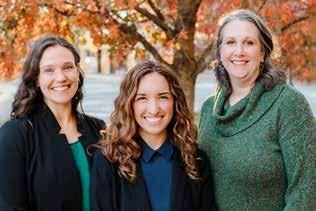



The U.S. upped the ante on June 21, utilizing a combination of B-2 “stealth bombers” dropping GBU-57 Massive Ordnance Penetrator “bunker buster” bombs and submarine-fired cruise missiles against three key Iranian nuclear sites.
[Note: This column was filed on June 24, just hours into a ceasefire engineered/man-
dated by the United States.]
My friend in Tel Aviv called the initial Israeli attacks on Iran “brilliantly conceived and executed,” but remained “mystified” at how the same military and intelligence apparatus failed so greatly before and on Oct. 7, 2023, when Hamasled terrorists slaughtered 1,200 men, women, and children, and kidnapped 250 more from the “Gaza envelope” in southern Israel.
While Israelis take pride in Operation Rising Lion, they have been told a national commission of inquiry into the Oct. 7 failures must wait until after the war in Gaza. (The Israel Defense Forces has issued assessments of its performance at individual locations and a number of high-level military and intelligence officials have resigned.)
Israel’s successes against Iran — the patron of Hamas, Hezbollah, and the Houthis — may allow Prime Minister Benjamin Netanyahu to reclaim a portion of the mantle of “Mr. Security” tarnished by Oct. 7. He has appeared less willing to take responsibility for those failures, pointing fingers or allowing his allies to point fingers at the same military and intelligence agencies hailed for the Iran operation.
Six hundred and twenty-eight days have passed since Oct. 7 and, at this writing, 50 hostages remain in Gaza, of whom maybe 20 or more are believed to be alive.
Operation Rising Lion has shifted scrutiny away from the war in Gaza and the plight of the hostages. Soon enough, though, a measure of attention will return to those subjects and the Israeli public will resume demanding answers about what happened before and on Oct. 7, and demanding accountability, beginning with the prime minister. ì
We Buy, Sell or Trade!
Come See Us!
We do jewelry repair on anything - gold, platinum, sterling silver, fashion, vintage and estate jewelryAlso, custom design, appraisals, watch batteries, watch repair, silver repair on tea pots, etc Monday-Friday 10 am - 6 pm Saturday 10 am - 4 pm 770-565-6558





Parkaire Landing Shopping Center 4880 Lower Roswell Road, Suite 175 Marietta, GA 30068 | www.adamarkjewelers.com
In recognition of the Atlanta Jewish Times celebrating its 100th year from its first edition in 1925, the AJT will re-publish articles from the Southern Israelite from editions dating as far back as 1929, the earliest edition available through the Digital Library of Georgia. All of the Southern Israelite editions, from 1929-1986, can be viewed at gahistoricnewspapers.galileo.usg.edu/lccn/sn78003973/
Please enjoy this retrospective of Jewish journalism in Atlanta and across Georgia, and thank you for supporting the Atlanta Jewish Times for the last 100 years.
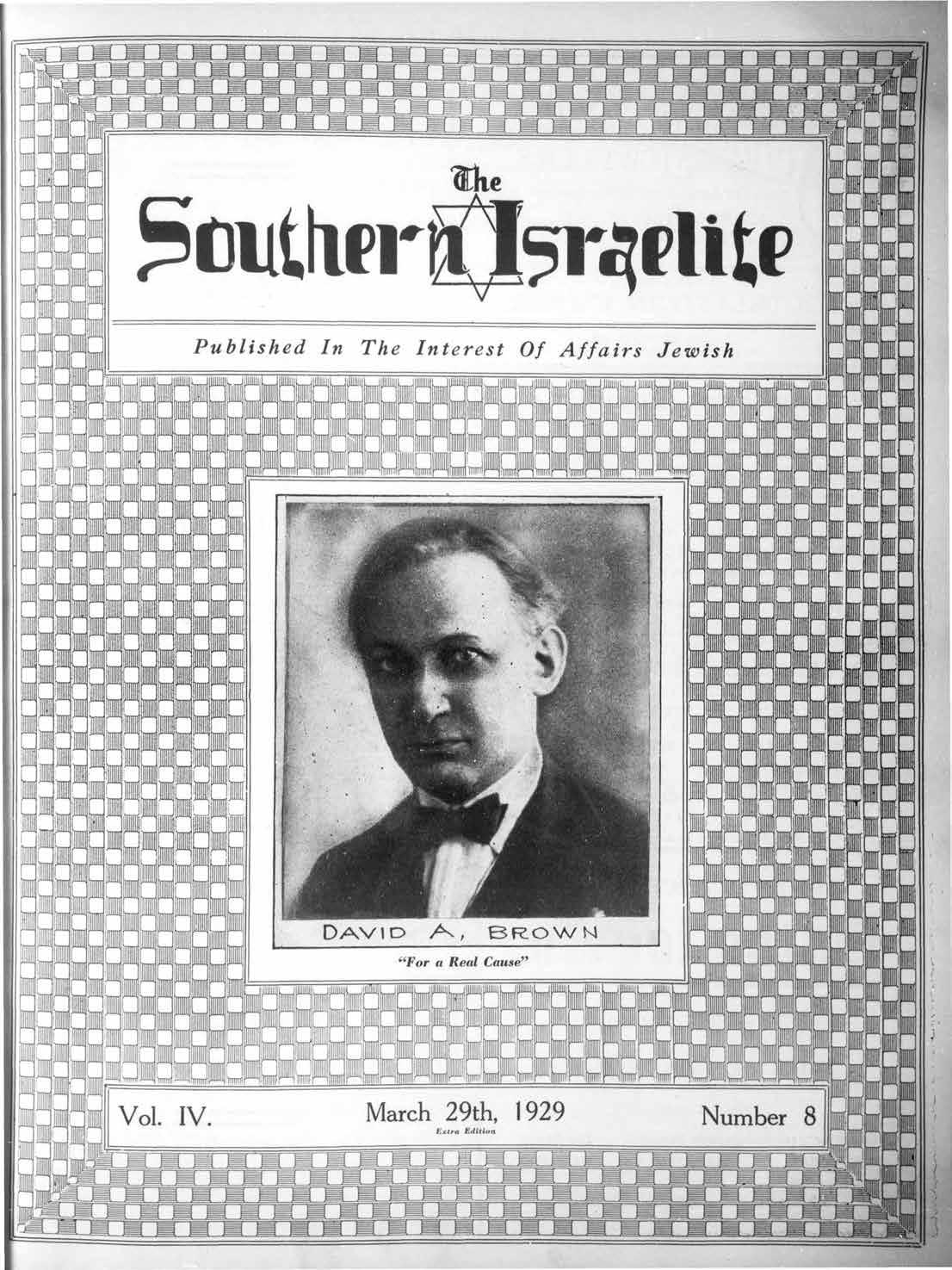
By Marcia Caller Jaffe
According to reproductive/fertility medical doctor, Quinn Katler, infertility affects one in six couples worldwide, as the number of children born through assisted reproductive technology (ART) and in vitro fertilization (IVF) continues to rise.
From the Biblical account of Rebecca’s struggle with infertility to the postHolocaust emphasis on rebuilding the Jewish population, Jews have consistently been given the mandate to “be fruitful and multiply.” As more Jewish couples pursue IVF and infertility treatment, the need for halachic supervision, religious oversight ensuring adherence to Jewish law, has also increased.

In observant Jewish communities, some halachic authorities require hashgacha, a formal religious supervision process for all fertility treatments. Under this system, a trained observer (mashgiach) must be physically present during key procedures, including the egg retrieval, fertilization of the egg, sperm collection, embryo evaluations, and embryo transfer. The presence of a mashgiach ensures that the genetic material that is used aligns with Jewish legal and ethical guidelines. While hashgacha is widely available in Israel, it has historically been difficult to access in
As more Jewish couples pursue IVF and infertility treatment, the need for halachic supervision, religious oversight ensuring adherence to Jewish law, has also increased.
the southeastern United States — particularly in Georgia.
According to Dr. Katler, that has now changed. He said, “For the first time, observant Jewish couples in Georgia can undergo fertility treatment with full
halachic supervision without needing to travel out of state. This breakthrough fills a critical gap in care for Orthodox families and reflects a broader commitment to religious inclusivity within reproductive medicine.”
Founded in 1979, Dermatology Associates of Atlanta, P.C. (DAA) has been helping the metro Atlanta area with all of their skin care needs for over 45 years. Their mission since opening has been to provide comprehensive skin care from head to toe. This means covering all aspects of both general and cosmetic dermatology. Their staff of board-certified dermatologists, physician assistants, and additional dermatological experts are dedicated to delivering the most professional and personal level of care to every patient they treat.
Led by their three partners including Dr. Scott Karempelis, Dr. Joseph Payne, and Dr. Ashley Curtis, the providers at Dermatology Associates of Atlanta have over 250 years of combined experience in their fields. Their licensed and experienced team of providers stay on the cutting edge when it comes to adopting and mastering new treatments and technologies for their patients. Each provider has a different specialty, allowing for treatments to be directly tailored to each patient’s unique skin. Dr. Karempelis and Dr. Curtis have been recognized as Top Doctors in Atlanta

for many years.
Dermatology Associates of Atlanta specialize in the diagnosis and treatment of the most common conditions and issues pertaining to the skin, hair, and nails. This includes providing a wide variety of safe and effective skin cancer treatments including Mohs skin cancer surgery, cryosurgery, photodynamic therapy (PDT), laser treatments, and more. They have comprehensive expertise in helping patients who experience acne, eczema, psoriasis, rosacea, age spots, sun damaged skin, nail fungus, spider veins, unwanted
body hair, warts, moles, hair loss, and so much more.
Dermatology Associates of Atlanta is a comprehensive practice that features nine specialty centers within one location, all dedicated to promoting healthy skin, hair, and nails. This includes Skin MedicsTM Medical Spa, the Laser Institute of Georgia, and The Center for Non-Surgical Hair Loss, as well as an on-site surgical suite for any dermatological surgery procedures. This adds an additional element of convenience for all of their
patients, regardless of their specific needs. All laser treatments performed at the Laser Institute of Georgia are done so by boardcertified dermatologists or physician assistants, adding an additional level of safety for their patients.
The goal at Dermatology Associates of Atlanta remains providing the best possible skin care using the most advanced treatments and techniques available, while also making sure that each appointment is as comfortable, pleasant, and convenient for their patients as possible. For more information or to schedule an appointment today, contact Dermatology Associates of Atlanta by phone (call or text) at (404) 256-4457. And find them online at DermAtlanta.com.


Dr. Katler, a reproductive endocrinologist at Shady Grove Fertility (SGF), spearheaded this initiative in collaboration with the Atlanta Jewish Fertility Foundation (JFF-ATL), ATime, and local rabbinic leaders.
“Access to halachic supervision was a major barrier for some Jewish couples considering IVF in Georgia,” says Katler. “Our goal was to provide a local solution so patients could receive treatment without added stress or disruption to their care. No one should have to leave their city, their doctor, and their support system to start a family. I knew we had to make a change.”
Katler worked closely with Rebecca Guttman (JFF-Atlanta manager), Rabbi Heilpern (ATime), and local leaders, Rabbi Yossi New and Dovid Barber, to recruit and train a team of certified mashgichim The training process includes classroom instruction, in-person experience at SGF’s IVF lab, and collaboration with embryologists to develop a halachic oversight system that aligns with both Jewish law and medical protocols.
“This program is life-changing,” says Guttman. “It allows observant Jewish couples to pursue their dream of parenthood without having to choose between their faith and their medical care.”
For observant patients, hashgacha ensures that eggs, sperm, and
embryos are continuously monitored throughout the IVF process. Dovid Barber, who helped establish the program, emphasizes the importance of this milestone.
“This initiative bridges the gap between modern medicine and religious practice, allowing more observant Jewish families in Georgia to pursue IVF with confidence and peace of mind.”
Dr. Katler trained in Israel and has long been involved in Jewish fertility advocacy. He sees this as an essential step forward. “The demand for fertility treatment among Jewish couples is growing, and now, those who require halachic supervision have an option here in Georgia. This was long overdue, and I’m thrilled to see our community stepping up to make fertility care accessible to all.”
Beyond his professional work, Katler has a personal connection to fertility treatment. He and husband, Jamin Gluck, recently welcomed their first child through IVF and surrogacy.
“I understand firsthand how much this means to families,” he related. “Every family’s path is unique, and I’m committed to ensuring that all Jewish families, regardless of their level of observance, have access to this care.”
Dr. Katler also hopes this model can be replicated in other regions facing similar challenges. ì
• Jewish Fertility Foundation - Atlanta (JFF-ATL): Since 2015, JFF-ATL has provided financial, emotional, and educational support to individuals and couples facing infertility.
• SGF Atlanta: The largest fertility clinic network in the U.S., SGF offers fertility evaluation and treatment at its flagship Atlanta office in Sandy Springs.
• ATime: A New York-based nonprofit specializing in fertility support for observant Jewish patients, ATime helped implement Georgia’s halachic supervision program. For more info, please visit https://www.shadygrovefertility.com/our-careteam/doctors/katler/

By Robyn Spizman Gerson
Dietary restrictions make eating out a challenge for many. It’s especially appreciated when a restaurant has menu options or prepares your order your way. Perhaps this sounds familiar? Are you someone who knows this drill? No nuts, no dairy, gluten-free, no salt, no pepper, no spices, dressing on the side, and the list goes on and on. One thing is certain -- it’s not always easy for the diner who has specific needs.
If you’re looking for Southern comfort food and have dietary challenges, Chapmans Café in Sandy Springs is a welcoming choice dedicated to making dining more enjoyable for those with special requests. They are devoted to their customers’ enjoyment and wellbeing and recently moved into a larger space, personalizing their dining experience. While more restaurants around Atlanta are willing to cater to customers’ needs, there’s certainly a growing trend to consider dietary restrictions, however not all are able.


Chapmans Café, run and owned locally, cares about its customers beyond measure. They enjoy interacting with customers and agree it’s important to know how a restaurant prepares the food

location on Roswell Road. According to Chef Bert Chapman, Chapmans’ primary focus is delicious food that’s healthy. He said, “It is very important to me to use local farmers and growers around this area to support small businesses. Chapmans is easily discovered as we source local produce and make most items on premise from scratch, so we know what goes into our food and take precautions.”
Delicious items at Chapmans include a variety of soups that are seasoned to perfection, not too much or too little, like their chicken and rice, gazpacho, and alternating weekly choices. Their soups do not lack anything in taste or texture.
and what’s the best match regarding your dietary restrictions. For example, most menus identify gluten sensitive vs. strictly gluten-free and there’s a significant difference. Ask questions and learn before you order. Call ahead and see if a menu has options that cater to your needs. Be mindful of the restrictions that apply to your individual dietary restrictions as it’s important to know before you go.
Cheryl Orlansky, RDN LD CDCES, a registered, licensed dietitian nutritionist and certified diabetes care and education specialist (www.orlanskynutrition. com) shared a helpful example, “Gluten intolerance is a condition where some people experience symptoms after eating gluten in foods. Those with gluten intolerance can eat in restaurants that are not strict with cross contamination. A small amount of gluten exposure is fine for those that are sensitive. However, people with celiac disease must follow strict guidelines and eat in establishments that have trained staff in keeping all gluten containing products in separate areas.”
Diners looking for a local restaurant that is willing to adjust a dish to fit your needs will discover a variety of choices at Chapmans. It has been and continues to be a fan favorite. Bert and Andrea Chapman have welcomed a loyal following over the past 12 years since they opened Chapmans, which is a popular dine-in and take-out restaurant.
With iconic training at the Culinary Institute, Bert Chapman has a soughtafter career working at Pricci, The Buckhead Diner, and Bacchanalia, to name a few. Chapmans presents a Southern comfort food flair to his new Sandy Springs
Bert Chapman adds, “Our refrigerator cases are also filled with casseroles and a variety of take-out options, both frozen and fresh meals available to serve immediately. Our customers come back for favorites like our egg salad, chicken salad, tuna salad, curry chicken salad, and don’t miss my balsamic vinaigrette. We’re in the business of just making people happy. Our food is about eating here and relaxing, with friends or family and having a good time. It’s easy to pick up a full dinner for a party or dinner for one and many of our customers love those meals where it looks like they even made it themselves.”
He continued, “I try to do different options every day. We’re often told our food is coined as clean. I don’t personally like to eat processed foods so why would I serve that, so you stay focused on healthy eating. We serve clean food, great salad sandwiches, and our customers are like family, having supported us for almost two decades. People can now sit and talk and dine and talk and it’s nice and clean. Customers are even here playing canasta or mahjong.”
Marty Alterman said, “I’ve been a customer for a long time. I love their chicken salad and turkey sandwiches. Bert listens carefully and even as a result, has what he calls Marty’s bread, which is my favorite. I take out lunch a lot and it’s delicious, easy, and we play canasta there in his new location. Bert is so generous, and we feel at home, even taking home frozen dinners and having lunch plus having a great time playing cards.”
It is clear Chapmans Café will be in the cards with a steady following of happy customers. Be sure to let them know if you want them to put the dressing on the side or have any other requests. For more information and hours, check out Chapmans at www.chapmanscafe.com. ì
By Marcia Caller Jaffe
Duluth Chiropractic recently expanded to include the Good For Life Integrated Health Center. The grand opening and ribbon cutting ceremony were held on May 30 as an official welcome to meet the team and discover their new services in acupuncture, massage therapy, and functional medicine. Good for Life will combine ancient healing traditions with modern techniques to provide comprehensive care tailored to individual needs. There are five employees at the new location.
Dr. Steven Sommer D.C. is the practice owner and lead chiropractor at Duluth Chiropractic. His mission is to restore health for people of all ages through natural chiropractic care. He stated, “My treatments have helped thousands of patients manage their conditions effectively, allowing them to return to their normal lives and activities. I combine the latest technologies in the field with evidencebased chiropractic care to help patients reach their health goals.”
He has received special training in rehabilitation of individuals from car
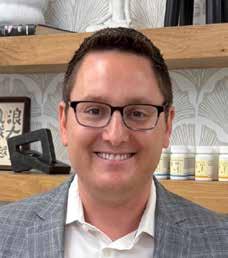
accident injuries from the Spine Injury Institute of San Diego. He completed a comprehensive training program in whiplash and brain injury traumatology, emphasizing the biomechanics of injury mechanisms.
He further related his call to healthcare to Judaism, “Healing isn’t just about


fixing physical issues; it’s about caring for the whole person — body, mind, and spirit. At Good for Life Integrated Health Center, we believe in supporting that entire journey by offering chiropractic, acupuncture, functional medicine, and massage therapy — all under one roof,” explains Dr. Sommer. “We’re dedicated to help treat a wide range of conditions. In Judaism, looking after your health is seen as a meaningful act of respect for the gift of life and the body that G-d gave us.”
In a recent case, Sommer stated that he had a patient who was slated for surgery with a disc herniation in his lower back. The man could barely walk and had given up hope. With several treatments utilizing spinal decompression, chiropractic adjustments, exercises and rehab, the patient’s pain went from 10 to zero. The patient gained full function and was able to return to normal activities with no residual issues and no surgery. The new expansion will help more patients receive access to more options for natural pain relief, rehabilitation, and wellness care all under one roof.
Dr. Sommer grew up in Niskayuna, N.Y., until he went to college at Penn State University, and then moved to Atlanta in 2010 for Chiropractic School at Life University in Marietta. He has been the owner and operator of Duluth Chiropractic and Wellness Center since 2016. As a power health care couple, wife, Alex Sommer, has been employed at Children’s Healthcare of Atlanta (CHOA) for more than 10 years where she is the lead educator for the child life specialists in the CHOA system. That role is as a healthcare professional who helps children and families cope with the stress and challenges of medical experiences, hospitalization, and other healthcare situations. She has specialized training in child development, psychology, and therapeutic techniques.
The family belongs to Temple Sinai. Steve Sommer is an avid basketball and tennis player and has participated in the MJCCA basketball league for more than a decade. He also coaches youth basketball at the JCC and YMCA and is active in the Duluth Kiwanis Club charity children’s initiatives. Dr. Sommer and Alex have two daughters, Maya (3), and Molly (1). They live in Chamblee. ì

By Marcia Caller Jaffe
Bill Reif, a physical therapist with 47 years of orthopedic and sports medicine experience, took nine months to write, “Treat Your Own Pickleball Injuries.”
After three days of posting on Amazon, it rose to No. 1 in New Releases. No surprise since more than 19.8 million Americans played pickleball in 2024, a 45 percent increase over 2023. There are approximately 48 million players annually. It’s also no surprise that $377 million in health care costs accounted for 10 percent of these unplanned medical expenses. Pickleball injuries are often the result of falls, overuse, or sudden movements during play.
Before adding being an author to his resume, Reif earned a master’s degree from Emory University and is the group expert for “Senior Pickleball Tips,” a 100,000-member pickleball community on Facebook. At one time, he had 23 physical therapy clinics throughout Georgia along with several partners.

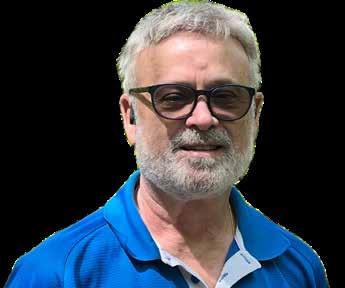
Now retired, Reif engages in conversations with players of all ages regarding their musculoskeletal complaints. He plays at a club with more than 1,200 members.
He stated, “The friendly nature of the pickleball population enables many

to share their injury history as soon as they learn that I’m a physical therapist. Often, they relate a prior history of injury, a pre-existing diagnosis, a work- or sports-related injury or have become de-conditioned due to a sedentary occupation or lifestyle. Usually, they report a new irritation or pain but choose to play on and hope it would resolve on its own.”
He often gives out simple advice and follows up with illustrations of exercises. In cases where the injury appears to be more involved or unclear, he urges them to get a definitive diagnosis from a physician prior to playing.
He explained that pickleball-related injuries occur most frequently in older people. “Around 60 percent of pickleball injuries are sprains, strains and fractures. Twenty percent are contusions, abrasions, or internal injuries, and fewer than 10 percent are lacerations or dislocations.”
Women are more susceptible to diagnoses such as carpal tunnel syndrome, but the injuries are generally the same in number and type of injury.
Reif’s tip for staying safe:

1: Proper warm-up stretches help prevent straining muscles and helps the body achieve a full range of motion. Warm-ups should last five to 10 minutes. Walking or jogging is a great place to start, followed by arm and leg stretches. Players should also warm up with light hitting at the No Volley Zone (Kitchen) and the baseline.
2: Wear eye protection
3: Never “back pedal” (instead, turn, run, set); back pedal injuries may result in wrist fractures or a blow to the back of the head.
4: Turn to reach a lob and remember
that your partner is the preferred player to retrieve the ball when it is directly behind you.
5: If you are already wearing a sleeve, splint, or brace, you must strengthen the underlying muscles, tendons and ligaments, since dependency upon these protections may gradually cause weakness.
If you’re a former tennis, badminton, or table tennis player, you may need to unlearn some of your former technique (such as reducing the long arc swings and dependency on overhead lobs).
6: Do agility warm-ups before playing both static (such as squats and runners stretch), or dynamic, short, quick sprints or repeated jumps.
7: Warm-up stretches help you prevent straining muscles and helps your body achieve full range of motion.
Now volunteering to guide fellow players at Ace Pickleball in Roswell, Lifetime Fitness in Alpharetta, and the Marcus Jewish Community Center of Atlanta, Reif meets new players every week, and plays at several levels, ranging from DUPR 2.5 to 4.0. Sometimes, he plays at a lower level to give his body a rest or to practice a new skill.
Note: Reif’s book is only about the following minor self-treatable injuries: neck pain, back pain, rotator cuff, biceps tendonitis, “Pickleball Elbow,” wrist and hand sprain/strain, knee patellar tendinitis, chondromalacia, hip bursitis, Piriformis Syndrome; Achilles tendonitis, hamstrings and calf strains; plantar fasciitis, and calcaneal bursitis.
“Treat Your Own Pickleball Injuries” contains more than 125 pages of exercises for the 10 most common injuries and is available on Amazon. ì

By Robyn Spizman Gerson
For anyone traveling to Paris, Flora Goldenberg, owner of Jewish Tours Paris, is your go-to-expert prepared to customize your experience. Goldenberg has a dedicated team of specialized tour guides and customizes her visitors’ itineraries depending on their wishes to make their trip experiences as memorable as possible.
Goldenberg studied art and history at the Sorbonne University for five years. Fluent in English, she guides visitors from around the world to Paris museums, monuments, and beautiful quarters such as The Louvre, Versailles, Musée d’Orsay, Montmartre, Le Marais (the Jewish Quarter), museums, monuments, neighborhoods and more. She offers themed tours ranging from Jewish tours to World War II tours, French Revolution tours, food and markets as well as day trips from Paris including Versailles, Giverny, Loire Valley, and Normandy.
The Jewish walking tour is one of Goldenberg’s most popular tours, and the combo Jewish Marais/Jewish Louvre as well. She recently added a new exclusive tour at the Grand Synagogue as the only guides allowed to guide there, and the combo Jewish Marais/Grand Synagogue. Her two-hour visit to experience what’s Jewish about The Louvre and the idea came from her “mum,” who became a tour guide in Israel, and during her training, she was looking for specific paintings she heard of when studying in Israel and realized the painting was in The Louvre. She worked as a guide in Paris for more than 20 years, never knowing it was there and the idea of the Louvre with a Jewish twist was born.
Goldenberg explained, “We designed the tour based on the artifact found in the Middle East and related to the history of Israel, as well as the paintings of French painters who painted the Jewish people in North Africa. I discovered a lot of artwork related to WWII and the art stolen from Jewish families and was also able to build bridges between the art, the history of the Jews in Paris, and how it all related. I was able to find the names of important Jewish donors.”
With enthusiasm, Goldenberg noted, “Every day, I make new discoveries, and The Louvre is full of treasures. I am working on a tour oriented towards the Bible and the stories of the Old Testament in The Louvre, artwork representing certain scenes, as well as the archeo-
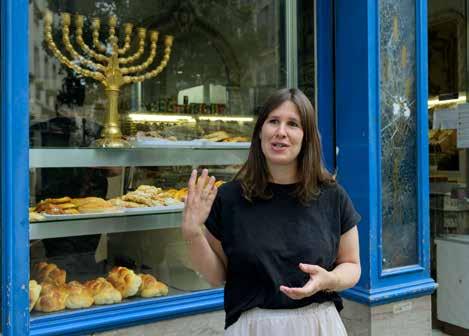
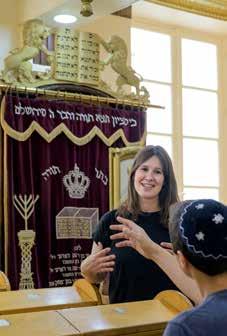

logical proofs of the Bible.”
Goldenberg was inspired by her mother, also a tour guide in Paris, and she said, “My family lived in Rue des Rosiers, the Pletzl of Paris for more than a century. My mother is a professional tour guide as well, and my inspiration. We share the same passion for Paris, art, and history. I make it my everyday mission to structure a knowledge about the Jewish heritage of Paris we can transmit more easily. I go to The Louvre for physi-
cal evidence and artifacts coming from Israel’s kingdom or North Africa, Iran and nearby regions.”
Goldenberg was born and raised in Paris, in Le Marais, and the Jewish Quarter of Paris has always been her home, and she still lives there. Explaining her legacy to Paris, which is etched in history, she shared, “My grandfather was born in Paris and lived in Le Marais with his parents. In WWII, his parents and three sisters were deported. His fa-
ther had a small shop on Rue des Rosiers, the main Jewish street that my grandfather took over after the war. He opened a Jewish deli on the same street, and it was a big restaurant, where all the Jewish people from different origins liked to enjoy a meal that reminded them of their grandparents, homeland. I have fond memories of the restaurant and my grandfather working there.
“A family business, it felt very much like home. The restaurant was attacked
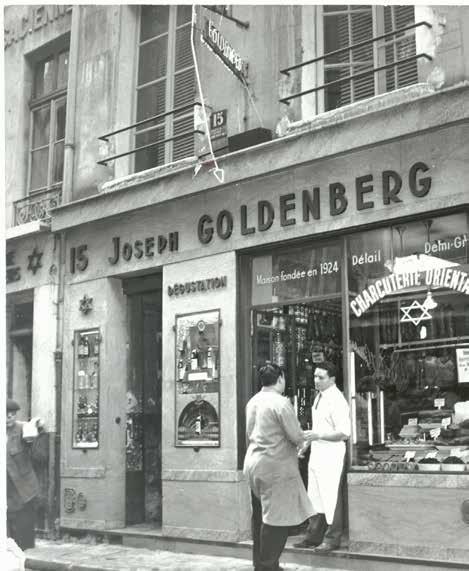
in a terrorist attack in 1982 (I was born in 1988), and I only know it after the attacks. It was always a place that carried a strong symbol of resistance against terrorism and antisemitism. My grandfather was not scared and proud of what he accomplished. He was a very nice and generous man and liked to share stories with his guests and create memories for them.”
On Goldenberg’s Jewish Tour of Le Marais while walking in the paved cobblestone narrow streets of Le Marais, located in the heart of Paris, the “Pletzl,” you’ll learn it has been the center of Jewish life in Paris since the 13th century. Located on the right bank of the Seine, in the third and fourth arrondissements in Paris, in the center of Paris, near the Ile de la Cité (where Notre Dame was built and the city of Paris was born). You will find the 17th century private mansions and hidden gardens transformed into apartments, museums, art galleries, shops, cultural centers, and more.
Flora also organizes visits inside the beautiful synagogues of the neighborhood with the help of her local Jewish community and a visit of the Holocaust

memorial to Paris. Learn about the history of the Jewish communities in Paris for more than 2,000 years with Goldenberg or one of her highly experienced experts such as Livia or Melanie who are extremely well-versed and knowledgeable. From the Jews in the Middle Ages, when persecuted and expelled from the country in 1394, to the French Revolution and the occupation of Paris during WWII, discover places that a local knows about.
Goldenberg added, “Since Marais became a very trendy neighborhood, it has some of the best shopping, most delicious and unique gourmet shops. I enjoy the atmosphere of the old Paris in the Marais, with its royal square Place des Vosges. You will find a synagogue and the Chabad, pastry chef’s boutiques, the Picasso Museum and more.”
Regarding booking a tour, Goldenberg said, “Book in advance, especially for the high season (between March until the end of October and during holidays).” For more information contact Jewish Tours Paris and visit https:// jewish-paris-tours.com/ or Instagram @ jewish_quarter_paris or Trip Advisor. ì
2 ND & 4 TH THURSDAYS Doors open at 6PM Music. Nature. chill. repeat. Experience evening

JuNe-september


JUNE 12 | MAGNOLIA EXPRESS
JUNE 26 | KOBANOVA
JULY 10 | GSO JAZZ
JULY 24 | THE ELECTROMATICS
AUGUST 14 | PUSSYWILLOWS
AUGUST 28 | CAFÉ AU LAIT
SEPTEMBER 11 | SAINTE JANE
SEPTEMBER 25 | MARCELLA JONES AND BROWN LIQUOR BAND

By Marcia Caller Jaffe
Gone are the days of the matriarch laboring over changing pots, slaving over caldrons of chicken soup, chopping apples, and paying $7.99 for ketchup. A notso-new Passover concept is the all-inclusive resort where every possible luxury accommodates mostly families enjoying religious services, childcare, Jewish entertainment, and over-the-top gourmet food, reminiscent of the Catskills but on steroids and healthier.
Picture the multi-generational Lasko family, who plans for this one Passover experience “topping” last year, all of which requires “big shekels” and is priced accordingly.
Having family Passover all-inclusive experiences since 1985 at Paradise Island, Bonaventure Spa Westin, Innisbrook Golf Resort, and the Ritz Palm Beach, this writer headed to Aventura Resort in Fort Lauderdale for Passover 2025 with adult children and three grandchildren. Aventura, part of the Turnberry Isle Country Club with two golf courses, is especially enticing because of the property’s huge water park. The giant pipe mazes and waterfalls span acres and have kids enthralled … then there’s the Lazy River on which to meander, adjacent to the massive pools. Tidal Cove Water Park offers rides like Master Blaster and Flowrider Triple, the nation’s first three-lane surf simulator, all located around a 60-foot slide tower featuring seven pumping waterslides, and the gravitydefying, high speed Boomerang.
Passover liquor (tequila, gin, vodka) designer cocktails were offered poolside and at dinner (also wine). Not motivated to put on slippers for lunch? Kosher food trucks are adjacent to the pool, offering pizza, barbeque, Ice-ees, ice cream, and made-for-carb craziness. To fill in the gaps, the Parlor and Palm Café offers grazing on unlimited nuts, chocolates, more fruit, and coffee bar.
Security was “drum” tight. Wristbands are checked for all entry points. There are different levels of accommodation for price categories based on proximity to the dining, activities, suites, and the main building. This writer’s group opted for the lowest price in the Orchid Tower, a king room with adjoining queens for a party of six. Both rooms had patios and elegant bathrooms and wonderful linens.
Religious observance suits Orthodoxy but fits all levels with five daily minions and alternates for Sephardi. Some wore shorts and sandals to breakfast or


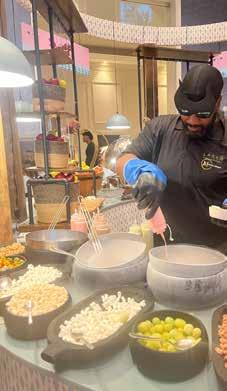

lunch, (not so much for dinner). On the flip side, the most beautiful tzniut (modest) dresses bloomed at night: florals, chiffons, silks, wigs, pleats, elegant sleeves, designer purses, and shoes made one outfit more gorgeous than the next. On holidays, nonJews stood by all elevators to press buttons and walk guests to rooms to utilize keys. If a tea bag was selected, a server was called to tear the paper. Torah educators
like Rabbi Moshe Nachbar held learning sessions. Shabbat dinner, when heads of households rose to bless children, was a cacophony of tunes, sentimentally bringing this writer to tears.
Other speakers included Adam Neuman, chief of staff for the Baltimore Ravens, an anonymous IDF hostage negotiator, and Eli Beer of United Hatzalah. Theme nights were Restaurant Row, Culinary Bi-
zarre, Sear ‘n Savor, and the most spectacular “Disney,” where costumed characters and princesses roamed the dining room with neon swords and balloons … and fun house mirrors made for photo heaven. Many nights offered a buffet and five-star “ordering off the menu.” Stations ranged from Mexican, Mediterranean/Israeli, Asian, Italian, Spa Cuisine, fresh smoothies and fresh fruit slicing,


omelet stations, salad bar (enough for a meal alone), prime cut meats/ lamb. How is dessert done for Passover? Do nuts, mousse, layer cakes … the dramatic nitrous ice cream bar was a magical hit
with kids. De riguer bagels, and smoked white fish, lox for breakfast. The dining staff was extremely accommodating. As most of the dining staff were Latinos, this writer wondered if they go home and tell


their families about “the Jews who can’t press elevators buttons and ask that their tangerines be peeled.”
The bottom line: this writer’s group only stayed the back half of the holiday.
The first half with seders was also available for around the same price, which was $29,000 for four days for the three kids and three adults (plus airfare). And it’s OK to bring the family dog. ì

• Socialite, Maverick Bar and Zinnia Café are some of our branded restaurants with broad selection of cuisine
• Full- Service Spa with indoor saltwater pool and hydrotherapy pool, nail and hair salon
• 1- & 2-Bedroom apartments with patios/balconies and customization options
• UV lighting, Negative Ion Emissions and Full Water Filtration System throughout our community
• Well-Fit program with personal training and unique assessments providing the best fitness for longevity
By Marcia Caller Jaffe
Eyes opened when CBS’ “Sixty Minutes” aired (April 21, 2024) “Investigating the horrors of a Nazi concentration camp [Alderney] built on British soil.” Six months later, Dorothy Carrillo and Tom Dell set off to explore: Guernsey, Sark, Jersey, Isle of Wight, and London.
Carrillo explained, “I was looking for a trip to add to a re-visit of London. I came across the Channel Islands tour. I knew about the World War II connection to these islands from reading “The Guernsey Literary and Potato Peel Pie Society,” and was familiar with the biography of Lily Langtree, the Jersey Lily who was a mistress of King Edward IV and a noted actress in her time. I signed up for the tour. I had no idea I would find a Jewish connection to these islands.”
German forces occupied the islands for the duration of World War II. Their guide shared that three Jewish women who lived on the islands, Marianne Grunfeld, Therese Steiner and Auguste Spitz, were deported from Guern-
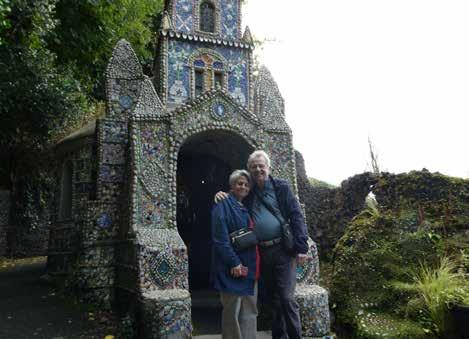
sey. All three would die in Auschwitz. A fourth Jewish woman, Miriam Jay (nee Jacob), was able to hide her Jewish identity because of an alleged affair with an
Wisland governor. On Guernsey and Jersey, the pair visited German-built bunkers, tunnels, and an underground hospital. Carrillo
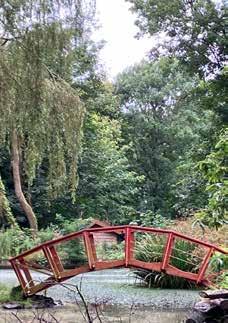
recalled, “No mention was made of the camps on Alderney, and it wasn’t until I returned home that I became aware of the horrific events that occurred there.”

ith a name inspired by the Monarch butterflies that call our Legacy Gardens home, Monarch Pavilion is the beautiful new four-floor neighborhood for all of Canterbury Court’s healthcare services. Featuring Assisted Living and Memory Support as well as Skilled Nursing, residents of all faiths receive the healthcare they need with the warm, person-centered approach Canterbury Court is known for.
To learn more and to schedule a personal tour, contact us today at 404-905-2444, visit CanterburyCourt.org/ ExpertCare, or scan the QR code.
Actual resident of Canterbury Court.





The original Channel Islands itinerary included Guernsey, Sark, Jersey, and a portion of the trip was a small group tour led by McKinlay Kidd. Alderney and Herm, a 494-acre Channel Island in the Bailiwick of Guernsey, were not part of the tour.
Carrillo learned that during the occupation, the Germans built several labor camps on Alderney. The roughly 2,000 Alderney residents had already evacuated to England; the island was deserted when the Germans arrived. For decades, islanders and members of the international community with interests in laying bare the full extent of Hitler’s atrocities have sought investigations. The availability of modern archeological tools provided the ability to map the area and discover what existed there.
Some of the camps built on Alderney housed forced laborers who did the construction work ordered by the Germans. Laborers were mainly Polish, Russian, Ukrainian and French. They were subject to horrible living conditions and physical torture. Another camp held political prisoners and others who had openly opposed Hitler.
Dell said, “An estimated 1,000 or more captives died from the conditions under which they lived or from punishments inflicted by the Germans. It is believed that over 7,500 prisoners were held there. However, Alderney was not

an extermination center. No gas chambers were found. After the war, the British government gave Alderney’s files to the Soviet Union through the UN War Crimes Commission. The USSR didn’t act on the evidence so that most Germans assigned to Alderney escaped trial.”
For other parts of the trip, Carrillo and Dell enjoyed The Isle of Wight (not a Channel Island), two ferry rides away.
There they rode a chairlift to view natural cliffs and toured Queen Victoria’s Osborne House. They reported enjoying all the islands because each was different. Sark was rustic, Guernsey was upscale, and Jersey brought them recollections of Nantucket. They toured German bunkers, tunnels, the eerie German Underground Hospital, and the Fort Grey Shipwreck Museum. They visited archaeological sites and shopped the “high” streets, then walked along harbors with coastal views.
Carrillo concluded, “This trip was ideal if you want a low-key but thoughtprovoking experience. Tours of the islands started mid-morning and ended in mid-afternoon. There was a lot of walking, but mostly flat surfaces and sites were not far because these are small islands. If you like to be by the ocean, in this case the English Channel, if you like history, if you like natural wonders, if island life interests you, then a visit to the Channel Islands might be the trip for you.”




By Marcia Caller Jaffe
The “souped up” Jenny Levison has many dimensions. In addition to being a restaurateur, chanteuse, and actress, she’s an avid adventurist and not shy about the art of self-challenge.
Walking The Camino has been on her bucket list for a long while based on its beauty and the rigor of trekking 500 miles. The pilgrimage of The Camino dates back to the ninth century as one of the oldest and most well-known routes in Europe, leading to the Crypt of Santiago de Comostela Cathedral -- believed to house the tomb of the Apostle St. James.
Approximately 400,000 people from all over the world walk it each year. The entire route can be done on foot, bicycle, horseback and even wheelchair. The average age of walkers is 45.
Levison trained for the journey since the average day included a 10- to 20-mile walk. She explained, “If you’re doing multiple days in a row, it’s a lot. The terrain also varies and can be very hilly. I wanted to do the original trail which starts in St. Jean Pied du Port and finish in Santiago de Compostela. We took 35 days to complete the walk which included three rest days.”
She embarked with her friend, Nicole. They felt exhausted for the first week until they got into “the hang of the routine.” They slept soundly and went to bed early every night. She said, “I was basically out when my head hit the pillow.”
In terms of accommodations, there are three channels: youth hostels, private rooms, or hotels. Levison had experience in the youth hostels when she was younger and wanted more privacy and hot water, so they shared a room and had a private bathroom. The travel part began

Walkers found beautiful opportunities to leave messages.
with a flight to Paris followed by a train to the hike’s starting point. She estimated spending about $10,000 each, including airfare, accommodations, and meals for the six-week period. She suggested that it could be done cheaper if on a budget.

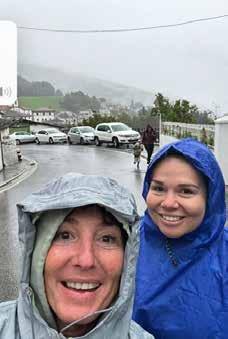

She elaborated, “Food is abundant from tiny cafes to nicer dining experiences. I loved when our accommodation offered dinner to pilgrims doing The Camino. It was a great opportunity to meet others and discover why they were walk-
ing. The whole experience was very spiritual for me. My father, Jarvin Levison, had passed away the November before, and it was a good time for me to process and work through my grief. It was also the first time that I have stepped away




At The Piedmont at Buckhead, you’ll encounter fascinating neighbors, stylish ambiance, chef-crafted cuisine, and a wide array of activities and clubs to embrace. If the dance of life has a hub, this is it.
Schedule a tour and embrace the retirement you imagine.



Embrace the retirement you imagine. New friendships, new passions, new discoveries, and new freedoms.
from work (running Souper Jenny) for six weeks without a lot of communication. It was a great lesson to see what an incredible team I have and how well they do with or without me! We have built an incredible culture; and it was a good feeling to know that I can trust them to live it even when I’m not around.”
To sum up the spiritual part for a Jewish woman, she stated, “Walking the Camino de Santiago is a different experience for everyone. For some it’s a religious experience, for some a spiritual journey, and some just love the challenge of the physical aspects of such a trip. We live in a very busy world, and it’s a gift to have an extended amount of time to have no other objective than walking from
place to place, enjoying hours of nature and introspection. It was an experience like no other and I’ll never forget it.”
Levison is always in search of physical challenges and internalizing and pushing herself physically takes her “out of her head” where she can truly think clearly and get creative. Her next challenge is 29029 Trail, which is a three-day event in Park City, Utah, where adventurers hike a mountain marathon each day for three days.
She concluded, “I’m sure it will give me plenty of time to come up with some new recipes! I always look forward to a delicious meal and a glass of red wine or a local beer at the end of each hiking day.” ì
Book a tour or RSVP for our upcoming event.
WEDNESDAY, JULY 16 th • 11:00AM
Join us for an engaging discussion on how you can create your ideal retirement lifestyle. Learn about the benefits of living well in our vibrant community, meet our dedicated team, and have all your questions answered.
After the presentation, enjoy chef-curated Carribbean appetizers, and take a guided tour. Please call 470.681.9849 to RSVP.
650 Phipps Boulevard NE • Atlanta www.RetireAtThePiedmont.com 470.681.9849 AT BUCKHEAD
SENIOR LIVING, REDEFINED. An SRG
By Susanne Katz Karlick
“The Little Liar,” Mitch Albom’s latest book, opens in the city of Salonika in Greece, shortly before almost the entire Jewish community is loaded in boxcars and sent to their deaths in AuschwitzBirkenau. In the initial pages of the novel, Albom notes, “This book is a work of fiction,” and “references to real people, events, establishments, or locales are intended only to provide a sense of authenticity.”
However, the author unquestionably knew the devastating history concerning the Jews of Greece, the country in Europe that saw the highest percentage of its Jews murdered during the Shoah. The highly impactful, educational, emotional, fullsensory trip was marked by key moments of remembrance as the group held its Yom HaShoah observance on the fateful platform in Salonika from which 50,000 Jews were deported. In all, the 32-member Temple Sinai group of travelers, led by Rabbi Ron Segal, now understands this dark chapter of history as well.
The following are some of their personal reflections, accounts that highlight both sorrowful and exultant experiences throughout the journey.
“One of the most awesome inspiring sites on our recent trip to Greece trip with Temple Sinai was the incredible breathtaking geological sandstone rock formations of Meteora. Perched atop these towering cliffs are 14th-century monasteries, strategically built to blend into the dramatic natural landscape. A popular tourist destination today, some are undergoing meticulous restoration to preserve its historic and spiritual significance.
“The most deeply moving moment of the trip took place in Salonika, coincidentally on Yom HaShoah -- the Day of Remembrance -- on April 24, 2025. Our group gathered at a modest, overgrown train station, the site where, in 1943, Jews were rounded up and deported to Auschwitz, where almost all were immediately murdered in gas chambers.
“The experience was especially emotional when a participant in our group shared her grandfather’s experience with us. Deported by train to Auschwitz as a child, her grandfather miraculously escaped, survived, and lived to share his story with future generations. Her story
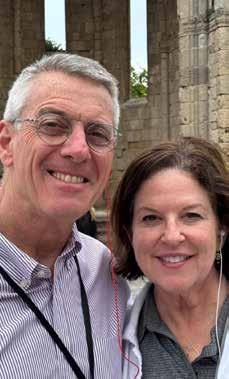
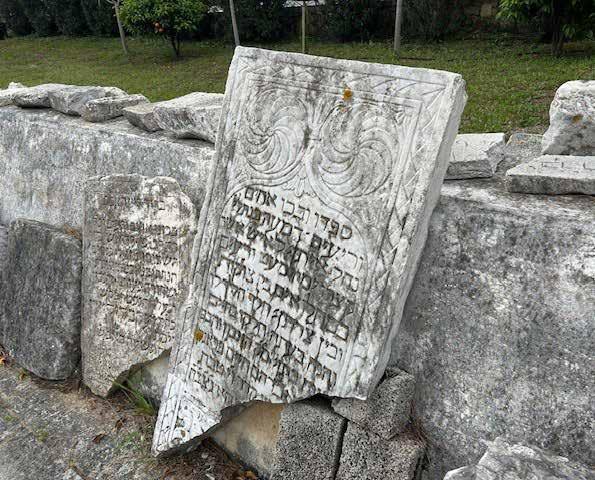

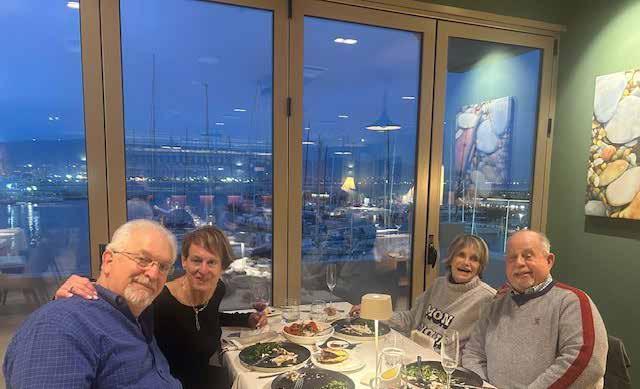
was intensely moving.”
“Amazing. Considering what happened to the Jews by the Nazis, it is amazing that our people and the Jewish religion have been able to survive and thrive since World War II. The strength of those who survived to tell the stories of their loved ones who perished and their families still alive today, was and is amazing when thinking about it. The trip evoked sadness about the past but also made us proud to be Jewish.
“As far as the sites, Meteora, the site
of the Grecian Monasteries, was breathtaking with the location of the monasteries built on these hills.
“As a trip designed to learn about Greece and the Jews with respect to the Holocaust and their deportation to Auschwitz, we were touched by many personal stories from members of our group and people we met. We experienced emotions of shock, sadness, tears, remembrance, and hope. A few in our group shared their family stories and it was quite touching.”
“The old synagogues moved me the
most. They are able to host very few congregants today due to the deportation of so many Jews to the concentration camps.
“On the other hand, visiting and experiencing the monasteries and nunneries on the mountain tops of Meteora was breathtaking and stunning! Building these structures on these inaccessible mountain tops was a feat of superhuman determination. This ancient country with its ancient history has brought you to the connectivity with the present day. Thanks to our rabbi and the tour leaders, we were opened to many perspectives of this time and the people of Greece.” ì



By Bob Bahr
In a back room, just off the chapel at Congregation B’nai Torah in Sandy Springs, Howard Newman is fiddling with the connections between a video screen and a small boombox with a DVD player. Newman is the Grand Sheik of the Atlanta chapter of the Sons of the Desert. The organization, which is said to have as many as 300 chapters around the world, is devoted to preserving the work of two of the greatest film comedians, Stan Laurel and Oliver Hardy.
Newman first discovered the films of the funnymen after his father brought home several that he had checked out from the public library in Ohio, where he grew up. Mixed in with the silent classics by Charlie Chaplin and Buster Keaton were short films by “the boys” as the two are affectionately known. He soon became hooked on the misadventures of the rotund Ollie as Hardy was called and his skinny dim-witted side kick, Stan Laurel.
“I started watching the films when I was growing up. And I came to realize

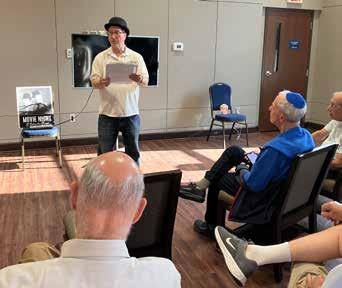
that of all the different comedians that I was viewing, that I was enjoying Laurel and Hardy the most, and so my first meeting with the Sons of the Desert was one month after the very first convention.”
Although he missed the first conven-






tion 60 years ago, he’s been a regular at the gatherings that have been held ever since. Mingling with fans from all over the world, meeting some of the actors and actresses who appeared in the films, watching rare classics was, in Newman’s words, the best.
“The conventions were wonderful. I looked forward to each convention like it was an exotic vacation. And I loved it, yes, absolutely loved it.”
Between the conventions that are held every two years, the fans of Stan and Ollie stay in touch with the occasion publication of the “Intra-Tent Journal” as the group’s news magazine is called.
One issue features the work of Laurel behind the camera. Although his comedy character was not very bright and slow moving, Laurel was the brains behind the pair’s astonishing success, sometimes serving as a film’s producer as well as working out the gags they did on film. But none of that intense work ethic ever appeared to rub off on the comic character he created.
Tonight’s film at the Sons of The Desert is the 1937 feature “Way Out West,” set in a comic version of the Wild West. When they first appear on screen, they’re not riding a pair of magnificent stallions. Instead, Laurel is walking and leading a mule through the sagebrush, while Hardy reclines on a wooden sled-like contraption, fully at ease as the mule and Laurel trudge on. They are making their way to Brushwood Gulch where they are hoping to find the daughter of a friend who has died and left the deed to a goldmine the daughter is to inherit.
There’s lots of opportunity for comic mayhem and even a few musical numbers, with the two doing a nifty and
surprisingly graceful dance before entering the town saloon. Once inside, Laurel mouths the lyrics of “The Trail of The Lonesome Pine” first in a bass voice, then when Hardy hits him on the heat with a mallet, chirping in what seems like a young woman voice. Many years later, after both comedians had passed on, the song showed up in Britain as one of the biggest pop hits.
This month marks the 135th anniversary of Stan Laurel’s birth, who formed a lifelong partnership with Oliver Hardy, who was born in Harlem, Ga., just outside Augusta. They were first brought together almost 100 years ago, in a short two-reel film, made at the Hal Roach Studios in Burbank, Calif. The film was called, “Putting Pants On Philip.”
The simple plot has Hardy making fun of a young man who is dressed in traditional Scots clothing of a short, pleated skirt and knee stockings. Then, he suddenly realizes that this young man, who seems oblivious to anything that’s wrong, is his nephew, who’s come from Scotland for a visit.
As simple as the story is, there was a chemistry that the audience detected between the haughty and embarrassed fat man and this slight, boyishly innocent, yet gently comedic young man. It was the first of 102 films the pair made over the next 25 years. Hardy died in 1957 and Laurel followed eight years later, but their memory lives on in the flickering images that Howard Newman has revived inside the Sandy Springs synagogue.
“The appeal of these two men is so deep and abiding,” he says. “It’s their essential innocence. They are two innocents in a world of sophistication and complexity.” ì

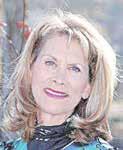
Sophie Kaufman is a self-proclaimed “color lover,” a mother of two, and “#happyhousedreams finder,” who’s passionate about infusing joy and creativity into every part of her life and sharing it with others. In other words, an ingénue “Martha Stewart” with a Morningside love letter to homemaking.
The Kaufman family home turns on the charm for this new generation lifestyle expert with an eye for detail to live deliciously in an unforced, sumptuous style as a base to raise kids. Kaufman explains, “I follow tons of interior design accounts and magazines with dozens of folders saved on my Pinterest and Instagram of design inspiration. I didn’t use a designer here and conceptualized everything on my own through ‘stalking and browsing.’ I sourced all the art and furniture myself, which is something that took lots of energy and patience.” Find her on Instagram @sophlog
With “Candy Crush nesting” where
nostalgia meets modernity, the Kaufmans are living at the “pink” of perfection. Sophie summarizes, “I want to bring a sense of wanderlust to everyday experiences.”
Take the tour …
Jaffe: What does it mean to be an influencer?
Kaufman: I really don’t consider myself one because I’m really all about community building on my platforms. Since the beginning, I’ve used social media as a tool to communicate with others and showcase my creativity. I’m lucky that many like to come along -- and have really enjoyed building a following that has grown with me through life’s stages. I’m very much an open book on my social, so I will share my lows just as much as my highs -- and that resonates with many.”
Jaffe: On what topics are you an expert?
Kaufman: Social media, digital marketing, copy and influencer marketing. I have always looked at personal social media as a brand development play -- and really love working with DTC brands on growth strategies through online marketing. I studied journalism at UGA and earned my master’s at the University of Southern California.
I’ve always been drawn to the world of ideas, color and storytelling -- whether through design, photography, writing, or just daydreaming.
Jaffe: Label your style.
Kaufman: Creating spaces that feel layered and lived-in, where the elements unite to tell a story. I’m drawn to classic elements like chinoiserie, antiques, and timeless silhouettes. I always balance that with a sense of fun, color and functionality. There’s a mix of old and new throughout the house, and every piece, vintage or modern, has a purpose.
Jaffe: How do all the colors interplay?
Kaufman: Our old home was a reflection of who I was then: vibrant, spontaneous, and unafraid to mix and match where I was color chasing murals. Now, I am chasing diapers and my sportsloving toddler. Here after becoming a mom, my sense of home evolved. I leaned into grand millennial and traditional styles, classic patterns, rich textures, and timeless pieces. It’s a blend of comfort and elegance, with a nod to vintage charm -- still feeling fresh and inviting. There’s lots of color throughout, with the art, wallpaper and playroom.
We are now more grounded with soft blues, warm whites, and timeless details. It’s still full of love and personality but now feels like a peaceful foundation for family life. For paint, I played off the wallpaper for a tonal effect. Goldie’s room has the most gorgeous Colefax and Fowler wallpaper in Bowood with matching fabric for pillows.
Jaffe: What is worth splurging on?
Kaufman: Wallpaper. It’s an upfront initial cost but has easy maintenance and durability. It totally transforms a room. My favorite wallpaper here is Schumacher’s Hydrangea Drape in the dining room. It’s the same wallpaper in “Gone with the Wind!”
Jaffe: Your kids’ rooms are idyllic. Kaufman: Goldie’s room is a total pink storybook dream. It’s bathed in soft shades of pink, mint, and ivory with whimsical florals, cozy textures, and brass touches. In our old home, Goldie lived in the dining room, so I was excited to finally bring her dream nursery to life. George’s room is a charming nod to all-American classics. The color palette is crisp blues and clean whites, so his space feels fresh and timeless. I custom upholstered his gingham beds for a clas-

sic look, and sourced baseball posters and equestrian artwork to reflect his passions. It’s a space that he can grow with for many years to come.
Jaffe: What do you collect?
Kaufman: Everything from antique Staffordshire dogs to brass trinkets to art and vintage frames.
Jaffe: What art of others did you use?
Kaufman: My art is a mix of high and low. Some pieces from HomeGoods, some I’ve painted myself, some I’ve commissioned by a Ukrainian artist via Etsy. Some I sourced via eBay and some I’ve splurged on from sites like Chairish. Most of the art is custom framed.
Jaffe: What’s the kitchen magic?
Kaufman: It’s the heart of my house. When we got the house, it was a dark green with brown tile. We refreshed it with white subway tile and painted it Farrow and Ball Parma Gray, a beautiful soft blue with gray undertones. It’s where we cook, play, eat, and talk. My husband and I rotate cooking each night, but lately I’ve been cooking with George (4) as a fun “mommy and me” activity.
Jaffe: You’re a personal injury attorney. What do you think about your wife’s ability to live artfully?
Michael: Sophie is the most creative and organized person I have ever met. We buy a house; and she has it fully decorated like a magazine within three months. I don’t always understand the vision, but I’ve learned to trust it! ì




Below: Goldie’s nursery is filled with whimsical florals, pink hues, and brass touches.
Left: George’s room was transitioned into a “big boy” bed from the crib, and it’s a space he can grow into for many years to come.


Tuesday, July 1
Brain Health Bootcamp – 11 a.m. to 1 p.m. JFCS’s program helps those recently diagnosed with cognitive impairments, or those who are recognizing symptoms of early memory loss, through cognitive and physical exercise and socialization. Brain Health Bootcamp is also a great opportunity to connect with others experiencing similar situations. Find out more at https://tinyurl.com/ypvrrn5b.
Women’s Torah and Tea – 8 to 9 p.m. Weekly women’s at the Chabad of Fulton in-depth and fascinating exploration of the Chassidus book of Tanya. Learn more at https://tinyurl.com/3dpyabb4.

Wednesday, July 2
Torah Class – 8 to 9 p.m. Join the Mitzvah House for a weekly Torah class for men and women. Snacks for the body and soul. Get more information at https://tinyurl.com/2vjzkw2h.
Thursday, July 3
Brain Health Bootcamp – 10:30 a.m. to 2:30 p.m. JFCS’s program helps those recently diagnosed with cognitive impairments, or those who are recognizing symptoms of early memory loss, through cognitive and physical exercise and socialization. Brain Health Bootcamp is also a great opportunity to connect with others experiencing similar situations. Find out more at https://tinyurl.com/3p4cje86.
Weekly Mah Jongg Night – 6 to 8:30 p.m. Join Congregation Beth Shalom’s sisterhood for weekly for a night of Mah Jongg. Find out more at https://tinyurl. com/3s9ez9px.
Saturday, July 5
Independence Day Outdoor Concert & Fireworks – 7 to 9.p.m. Join Congregation Dor Tamid for an evening under the stars with Cantorial Soloist Mike Zuspan and his wife, Amy. Join them for a picnic, followed by music and fireworks. RSVP at https://tinyurl.com/2vbapywy.
Sunday, July 6
Kabbalah and Coffee – 10 to 11 a.m. Start your week on a high! A weekly study series from Intown Jewish Academy with fresh bagels and lox with Rabbi Eliyahu Schusterman. Learn more at https://tinyurl.com/429nuh36.

Monday, July 7
Ancient Wisdom for Your Life – 8 to 9 p.m. Join Chabad of Fulton for a weekly journey into the Torah’s relevance. Obtain more information at https://tinyurl. com/58ck7ses.
Tuesday, July 8
Brain Health Bootcamp – 11 a.m. to 1 p.m. JFCS’s program helps those recently diagnosed with cognitive impairments, or those who are recognizing symptoms of early memory loss, through cognitive and physical exercise and socialization. Brain Health Bootcamp is also a great opportunity to connect with others experiencing similar situations. Find out more at https://tinyurl.com/ypvrrn5b.
A Fireside Chat on Jewish Christian Relations – 7 to 9 p.m. Join Chabad of Fulton for a meaningful evening of dialogue with Jewish and Christian leaders as we explore faith, friendship, and deeper understanding across communities. Get more information at https://tinyurl. com/2vdyewcv.
Women’s Torah and Tea – 8 to 9 p.m.
Weekly women’s at the Chabad of Fulton in-depth and fascinating exploration of the Chassidus book of Tanya. Learn more at https://tinyurl.com/3dpyabb4.
Wednesday, July 9
Torah Class – 8 to 9 p.m. Join the Mitzvah House for a weekly Torah class for men and women. Snacks for the body and soul. Get more information at https://tinyurl.com/2vjzkw2h.
Thursday, July 10
Brain Health Bootcamp – 10:30 a.m. to 2:30 p.m. JFCS’s program helps those recently diagnosed with cognitive impairments, or those who are recognizing symptoms of early memory loss, through cognitive and physical exercise and socialization. Brain Health Bootcamp is also a great opportunity to connect with others experiencing similar situations. Find out more at https://tinyurl.com/3p4cje86.
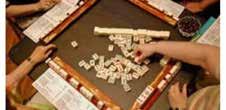
Weekly Mah Jongg Night – 6 to 8:30 p.m. Join Congregation Beth Shalom’s sisterhood for weekly for a night of Mah Jongg. Find out more at https://tinyurl. com/3s9ez9px.
Friday, July 11
Dive Into Shabbat - Pool Party at the JCC – 5 to 8 p.m. Dive Into Shabbat summer pool parties at the JCC! Join Rabbi Glusman for Shabbat songs and blessings. FREE and open to the community. Learn more at https://tinyurl.com/3y2zwxtx.
Sunday, July 13
Kabbalah and Coffee – 10 to 11 a.m. Start your week on a high! A weekly study series from Intown Jewish Academy with fresh bagels and lox with Rabbi Eliyahu Schusterman. Learn more at https://tinyurl.com/429nuh36.

PJ Library Splash Around Town - 10:30 a.m.to 12 p.m. Join PJ Library Atlanta as we splash into July! Each week we will meet up at a different splashpad around town. Attend as many as you would like! RSVP at https://tinyurl.com/4ztvew4c.
Monday, July 14
Will Power: Spiritual, Practical, & Legal Perspectives – 7 to 9 p.m. Join Beth Jacob for a complimentary threepart presentation on protecting your legacy, avoiding pitfalls, and ensuring your final wishes are fulfilled. Register at https://tinyurl.com/39wyzmt3.
Ancient Wisdom for Your Life – 8 to 9 p.m. Join Chabad of Fulton for a weekly journey into the Torah’s relevance. Obtain more information at https://tinyurl. com/58ck7ses.
Tuesday, July 15
Brain Health Bootcamp – 11 a.m. to 1 p.m. JFCS’s program helps those recently diagnosed with cognitive impairments, or those who are recognizing symptoms of early memory loss, through cognitive and physical exercise and socialization. Brain Health Bootcamp is also a great opportunity to connect with others experiencing similar situations. Find out more at https://tinyurl.com/ypvrrn5b.
Torah Reading: Chukat
Friday, July 4 Light Shabbat Candles at: 8:34 PM
Saturday, July 5 Shabbat Ends: 9:35 PM
Torah Reading: Balak
Friday, July 11 Light Shabbat Candles at: 8:32 PM
Saturday, July 12 Shabbat Ends: 9:33 PM

JBaby Intown Dude-Re-Mi – 3 to 5 p.m. Calling all grown-ups! Celebrate Father’s Day weekend with a toe-tapping, drumbanging, giggle-filled music class you and your little ones won’t forget! Great for ages 0-3. RSVP at https://tinyurl. com/59mwue7c.
Women’s Torah and Tea – 8 to 9 p.m. Weekly women’s at the Chabad of Fulton in-depth and fascinating exploration of the Chassidus book of Tanya. Learn more at https://tinyurl.com/3dpyabb4.
Wednesday, July 16
Torah Class – 8 to 9 p.m. Join the Mitzvah house for a weekly Torah class for men and women. Snacks for the body and soul. Get more information at https://tinyurl.com/2vjzkw2h.
Thursday, July 17
Brain Health Bootcamp – 10:30 a.m. to 2:30 p.m. JFCS’s program helps those recently diagnosed with cognitive impairments, or those who are recognizing symptoms of early memory loss, through cognitive and physical exercise and socialization. Brain Health Bootcamp is also a great opportunity to connect with others experiencing similar situations. Find out more at https://tinyurl.com/3p4cje86.
Weekly Mah Jongg Night – 6 to 8:30 p.m. Join Congregation Beth Shalom’s sisterhood for weekly for a night of Mah Jongg. Find out more at https://tinyurl. com/3s9ez9px.
Friday, July 18
Rockin Shabbat and Barbecue Dinner
– 6 to 9 p.m. Join Congregation Beth Shalom for a musical Shabbat. Immediately following the service, stay for a delicious barbecue dinner. RSVP at https://tinyurl. com/yvnnr48k.
Sunday, July 20
Kabbalah and Coffee – 10 to 11 a.m. Start your week on a high! A weekly study series from Intown Jewish Academy with fresh bagels and lox with Rabbi Eliyahu Schusterman. Learn more at https://tinyurl.com/429nuh36.
PJ Library Splash Around Town - 10:30 a.m.to 12 p.m. Join PJ Library Atlanta as we splash into July! Each week we will meet up at a different splashpad around town. Attend as many as you would like! RSVP at https://tinyurl.com/4ztvew4c.

Music & Joy: An Intergenerational Celebration – 3:30 to 5 p.m. Join us for a fun and heartwarming afternoon with Here We Grow! Babies, families, and residents will come together for a joyful musical experience filled with upbeat songs, sweet melodies, and special moments that bring generations closer. It’s a beautiful way to celebrate the magic of music — sharing joy, comfort, and connection. Don’t miss this chance to sing, smile, and make memories with the youngest and wisest in our community! Perfect for families with little ones ages 0-2. RSVP at https://tinyurl.com/2d7yydcj.

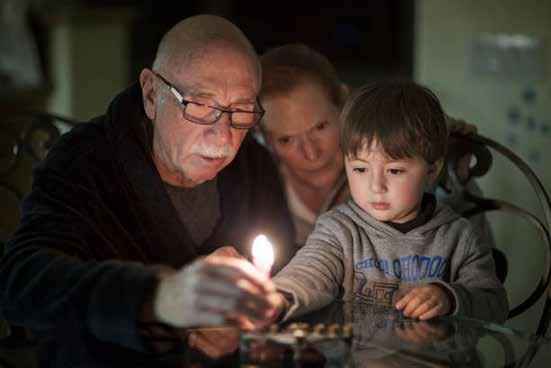



These Baked Pizza Egg Rolls are a fun and innovative twist on traditional pizza, with classic pizza flavors wrapped in a crispy egg roll shell. Perfect for a milchig meal, these egg rolls are easy to make and sure to please everyone.
Ingredients:
15 Gefen Egg Roll Wrappers
1 cup Gefen Pizza Sauce
15 cheese sticks or 1–2 cups shredded mozzarella Gefen Olives
roasted red peppers mushrooms, to taste
Directions:
1. Preheat oven to 375 degrees Fahrenheit. Grease a baking sheet with cooking spray.
2. Place an egg roll wrapper in front of you. Using a spoon, smear a spoonful of pizza sauce in center of wrapper, taking care not to spread too close to edges. Add your choice of cheese and toppings onto sauce.
3. Fold egg roll tightly so sauce and cheese don’t leak out. Repeat with all other egg roll wrappers.
4. Place egg rolls on prepared baking sheet and bake for 15–20 minutes, until crispy.
Tips:
For extra crispiness, spray egg rolls with cooking spray before baking.
Recipe by H. Herszberg
Photography and Styling by Penina Spero kosher.com

Sam meets his friend, Moshe, in the mall.
“Hi, Moshe, I haven’t seen you for some time. Nu? How is the company doing that you set up with Maurice last year?”
Moshe replies, “Well, as I told you then, I put up the money and Maurice put in his business experience. But things have changed since then.”
“How do you mean?” asks Sam.
“Now Maurice has the money, and I have the business experience.”
n. A person who is forever dramatizing the suffering they endure or believe they endure.
“That vey-is-mir-nik Asher gets on my nerves. Today, he was kvetching about how his hair is falling out from too much worry.”
From the Yiddish, “vey-is-mir,” meaning, “I am pain itself.”

By: Yoni Glatt, koshercrosswords@gmail.com
Difficulty Level: Challenging
ACROSS
1. He loved Lucy
5. Goes to the plate
9. Israeli peace maker
14. Physically perfect man
15. Eight, to Jose
16. Mrs. Donald (Trump), once 17. Jewish head covering 19. Moshav and Kansas
20. Name that sounds like a thick soup
21. It prevents literacy?
23. Letters of appreciation, ahead of time
24. Possible result of going to the plater
26. Jewish head covering 28. AKA Henry, (cinematic icon)
32. Bio., for one
33. Hogwarts, e.g., Abbr.
34. Hawks star that is Young
37. “Midnight in Paris” director
41. Omer month
42. Jewish head covering
44. It grows on walls
45. Pizza leaf
47. Foe of Israel, in Kings
48. Colorful neckwear
49. Colorful neckwear
51. Significant
53. Jewish head covering

This week, 99 years ago
58. Be in debt
59. El Dorado gold
60. Clark that made the WNBA much more popular
63. Shot callers, briefly?
66. Eilat, compared to Tsfat
68. Jewish head covering 70. Jewish name in makeup
71. Some call it pop
72. It’s a cow
73. Gives fuel to 74. AARP part: abbr.
75. Garcia of “Ocean’s Thirteen”
DOWN
1. Hoover and Roosevelt, e.g.
2. Make a correction
3. Days when Jews might wear fancier head coverings
4. Mischievous being 5. Raton lead in 6. Sore
7. Uses the microwave, perhaps
8. Powerful 9-Down drink
9. Related to scriptures
10. “Casino Royale” actress Green
11. Benny who lost to Bibi
12. Alternative music, now 13. Twangy, vocally
18. City of Samoa
22. Record albums, for short

Tuberculosis currently afflicting 75,000 adults and 20,000 kids in Poland, along with half of all Jewish school children in Ukraine.
This week, 75 years ago
Three AJCC softball leagues hold their first games of the season at Piedmont Park.
A Polish Catholic family that saved several Jews from the Nazis safely resettle in Canada thanks to funds from the Canadian Jewish Congress
In England, two Jews, Lewis Silkin, and Lt. Col. Harry Morris, are elevated to the House of Lords
Congregation Children of Israel in Augusta breaks ground on new temple.
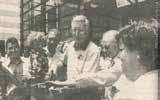
Zaban Ribbon Cutting: (from left) Emily Blank, Arthur Blank, Bernard Marcus, Erwin Zaban, and Laura Dinerman.
This week, 50 years ago
Israel closes Aliyah Office in Atlanta after 12 years
“Reb” Shleme (S.J.) Gold, former Kosher deli owner, and last surviving charter member of Shearith Israel, dies at 91 years old.
The Southeast Alaska Empire, Juneau’s daily newspaper, headlines the “first Bar Mitzvah ever performed in Alaska”
The Rabbinical Assembly Celebrates 75 Years of Conservative Judaism
25. Action at eBay
27. To the time when, briefly
28. Frost’s foot, perhaps
29. Sponsor of “March Madness”
30. 1st, 2nd, 3rd... ___
31. Square mileage, e.g.
35. Freshen, in a way
36. Mighty man’s name, in Hebrew
38. US Senator who could be seen wearing a 53-Across
39. Like Sinwar
40. The Big Board, initially
42. Is in a slump?
43. Melodramatic, in slang
46. Company that created Watson and Deep Blue
48. Dershowitz’s forte
50. ___ florentine (Italian cooking term)
52. Firm up, as muscles
53. Major Sephardic Rabbi name
54. Got up
55. Delivery person’s beat
56. “You have to ___ lot of frogs...”
57. Character of a culture
61. Fords produced until 1991
62. Terrorist supporting state
64. Dweeb
65. Kill, in the 9-Down sense
67. Lasso of note
69. Beer initials
Noted communal volunteer Abe
This week, 25 years ago
Alfred Uhry’s musical, “Parade,” premiers for the first time at the Fox Theatre.
MJCCA ribbon cutting for $20 million ZabanBlank Building draws thousands
Former President Carter speaks to crowd of 300 at Temple Beth Tikvah
U.S. Secretary of State Madeline Albright speaks to crowd of 3,000 at Ahavath Achim Synagogue
Issues of the AJT (then Southern Israelite) from 1929-1986 can be found for free online at https:// gahistoricnewspapers.galileo.usg.edu/lccn/ sn78003973/
David Livingston, 83, of Atlanta, and formerly of Baltimore, Md. passed away June 13, 2025. He is survived by his wife of 60 years, Sheila Livingston, son, Michael (Sylvia) Livingston, daughter, Lauren (Chris) Trad, siblings, Bonnie Livingston, Phyl Myra Cherry (Howard), and Bobbie Bookoff (Alan); and grandchildren, Leena, Cassidy, and Lucas. He was preceded in death by his siblings, Buddy Livingston, Charels Livingston, and Eleanor Rubinstein.

David was born and raised in Baltimore. He earned a degree in education and photography from the Maryland Institute of Art and taught art and photography at Baltimore City College (high school) for six years. He was an avid golfer and watched golf on TV when he was no longer able to play.
Graveside services were held at 10:30 am, Sunday, June 22, at North Atlanta Memorial Park (Dunwoody, GA). In lieu of flowers, contributions may be made to Jewish National Fund (jnf.org) and Angels Among Us Pet Rescue (angelsrescue.org). Dressler’s Jewish Funeral Care, 770-451-4999
Sondra Fleishman Rosenfield, 89, of Miami, Fla., the daughter of Louis and Mollie Fleishman of blessed memory, died peacefully on April 20, 2025, surrounded by her family. Sondra was born in Brooklyn, N.Y., and was the loving wife of Sheldon Rosenfield (z”l) for 39 years, and the cherished mother of Joel Rosenfield (Cheryl), Barry Rosenfield, Dr, Jeffrey Rosenfield (Melinda), and Ellen Bowers (John). She was the adored grandmother of Laura, Lisa, Rachel, Sara, Allison, Gregory, Jenna, Jacob, Joshua, Michael, Heather, and Malachi and enjoyed the blessings of 13 greatgrandchildren. Sondra is also survived by her sister, Zelda Schwebel.
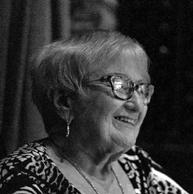
Sondra believed in the philosophy of better late than never, learning to drive after the birth of her fourth child and earning a college degree as a registered nurse concurrent with her first child attending college. Sondra subsequently worked as a registered nurse at South Miami Hospital.
Besides her love of family, Sondra was a fiercely competitive Mahjong player and also loved to bake and travel the world. To Sondra, Mahjong was more than just a game, Mahjong was a source of deep friendships, lively conversation, and endless laughter.
Funeral services were held at Lakeside Memorial Park and Funeral Home in Miami, Fla., on April 24, 2025, officiated by Sondra’s great-nephew, Rabbi Ari Kaiman, of Congregation Shearith Israel in Atlanta, Ga. Contributions in Sondra’s memory may be made to the charity of your choice.
Sondra will be deeply missed by all who knew her.

Janine Storch passed away peacefully on Sunday, June 15, 2025. She was born April 2, 1929, in Paris, France, to Pauline and Meyer Tchoudnovsky. She was pre-deceased by her parents and her sisters, Berthe, Fanie and Simone. Survivors include her daughter, Dominique Levin (Rael), grandson, Micah Levin (Beth), granddaughter, Chantal Spector (Mike), and great-grandchildren, Jacob and Hailey Levin and Charlotte and Jonathan Spector. Having survived World War II in a small village outside of Paris, she moved to New York where she met her husband, Jack Storch. She worked as a fashion buyer for a large department store while in New York but moved to Atlanta a few years later and together with her husband built a successful renovation business and their real estate investment company. She handled all bookkeeping and secretarial duties for over 45 years.
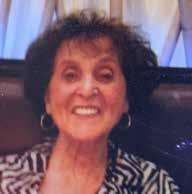
She was an incredible cook and balebusta. It was not uncommon to have over 40 people at her table for the Jewish holidays. A woman of strength and strong will, she will be remembered by friends and family as generous to a fault. A lifetime member of Hadassah and philanthropist to many Jewish causes, she will be missed.
In lieu of flowers, contributions can be made to Congregation B’nai Torah, JNF, Hadassah, and Hemshech.
Leonard H. Sussman passed away on June 11, 2025. He was 83 years old. Leonard was born in Brooklyn, N.Y., and grew up there and in Park Ridge, N.J. As an adult, he lived and worked in Pennsylvania, Washington, D.C., New York, New Jersey, and Texas, before finally settling in Atlanta. He is survived by his daughters, Brenda (Lee) Footer and Michele (Jack) Walsh, his brother, Edward Sussman, his granddaughters, Naomi Footer, Stella Walsh, and Adaline Walsh, and many nieces, nephews, cousins, and extended family. He is predeceased by his wife of 53 years, Marsha Sussman.
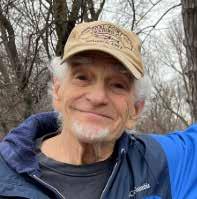
Len was a hard worker and loved learning, moving his way up from broadcast engineer to managerial positions, and eventually real estate manager for the Southeast Region at AT&T, where he worked for 28 years. After early retirement, he went on to serve as a consultant in the early cell phone industry. He loved all sorts of outdoor activities - running, walking, sailing, kayaking, biking, and ice skating, as well as working out and swimming daily at the gym, where he spent as much time chatting with friends as he did exercising. He loved to learn about people and their experiences. He continued this in his retirement community, where he became known as the guy bouncing his ball as he walked around the building, stopping along the way for many friendly chats. Above all, Len was a devoted husband, father, and grandfather. He loved his family fiercely, attending countless school and extracurricular events, never missing an opportunity to tell all who would listen about his girls.
In lieu of flowers, the family asks that donations be made in Len’s memory to feedingamerica.org. Arrangements by Dressler’s Jewish Funeral Care, 770-451-4999.

Mrs. Judith Rosenkrantz Tager of Atlanta, Ga., died on June 22, 2025, comfortably and peacefully in her home in Atlanta.

Mrs. Tager was born on June 27, 1934, in The Bronx, N.Y., the daughter of the late Dr. Maurice and Essye Rosenkrantz and sister to Edmund Rosenkrantz. She lived there until she moved to attend college at Barnard University, at which time her parents relocated to Scarsdale. Judy was a talented music major at Barnard College and earned her teaching degree and remained an active alumnus for over 60 years. She taught second grade in New Rochelle, N.Y., before meeting the love her of life, Milton Tager, at a Jewish summer resort in the Berkshires, meeting on the tennis court where it was love-love at first sight. She married Milton in December of 1956 and moved to Durham, N.C., and a year later to Charlotte, N.C., where they started a new business, the Hub Uniform Company, and raised their three daughters. Judy was very active in Temple Israel Hadassah, serving two years as president. She went back to graduate school at Central Piedmont in 1978 and earned her master’s degree in human development and enjoyed putting her skills in music and counseling into practice in various senior retirement homes and Planned Parenthood. She enjoyed the arts and music, reading, playing tennis, and sewing as well as traveling with her husband and family well into her later years. Judy and Milton relocated to Atlanta in 2005 to be closer to their daughters and their families and enjoyed all the culture the city had to offer, including taking senior classes at Emory. She was a life-long learner and a model student.
Judy is survived by her three daughters, Beth Benamy, Bonnie Draluck (Ron Draluck), and Debbie Buchman; her six grandchildren, Mark Draluck (Abby), Ross Draluck (Hillary), Sari Benamy, Joseph Benamy (Mandy), Brittney Yancey (Patric), and Dr. Madison Buchman; her six great-grandchildren, Micah Draluck, Margot Draluck, Michael Benamy, Brennan Benamy, Sammy Draluck, and Tatum Yancey. She is also survived by her brother, Edmund Rosenkrantz (Diane), and nieces and nephews, Elizabeth Rosenkrantz, Karen Rivo (Marc), Kent Tager (Kathi-Luise), Kirk Tager, and Keith Tager. She was preceded in death by her adoring husband, Milton Tager.
Graveside service for Judith Tager were held at Crest Lawn Memorial Park on Tuesday, June 24, 2025, at 10 a.m. Donations can be made to the Milton and Judith Tager Music Fund at Shearith Israel. Arrangements by Dressler’s Jewish Funeral Care, 770451-4999.
Jeffrey Victor, 77 years old, from Atlanta, Ga., passed away on Thursday, May 29, 2025. Jeffrey graduated from Riverside Military Academy, Gainesville, Ga., and Hollywood, Fla. He received a B.A. degree from Tulane University and an MBA degree from Louisiana State University, New Orleans, La
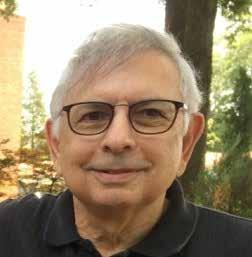
Jeffrey gained a lot of retail knowledge while working in well-known department stores in New Orleans. He also got his first taste in boating and sailing. They became a life-long passion until his advancing Parkinson’s made it too difficult to sail. Jeffrey also developed a passion for photography. When I was competing at horse shows on the circuit, he would accompany me. He learned a lot about photographing horses preparing to go into the ring. I teased him that he was more focused on my horses’ tails than me! He also studied how to take good black and white photographs and was learning how to develop his film.
Jeffrey’s career took off when he started working at Burroughs Corporation, a manufacturer of business equipment. That led him into working with companies providing automatic identification products and systems using bar code technology and supply-chain technology. Jeffrey volunteered his knowledge and expertise when we became members at Ahavath Achim. He was involved with AA’s Habitat for Humanity, the Women’s Shelter at Shearith Israel as well as Mazon’s, “This is Hunger,” traveling bus exhibit at the MJCCA, Jan. 18-19, 2017.
Jeffrey is pre-deceased by his parents, Dr. Samuel and Gertrude Victor. He is survived by his wife, Deborah Spector, sister, Lynda Gilbert, and loving family members and friends. Memorial donations may be made to the Parkinson’s Foundation, hunger initiatives through Ahavath Achim Synagogue, or a charity of your choice.




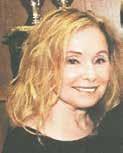
Shaindle
Schmuckler
Shaindle’s Shpiel
I am a person who has spent my entire life in a constant state of curiosity, with an insatiable need to know. Everything. While I am painfully aware that my brain refuses to admit it does not have the room to know and retain everything, the fire my brain keeps lit for knowing continues to burn, and it would see refuses be extinguished.
OK, I will admit, science is not my “thing.” Most of what goes on in the sciences frightens me or simply slips over my head, so I tend to pretend it’s a foreign language, one which I don’t need
to learn or even know about. Those who know me at all know keeping up with the Joneses, (whoever they are) is not my “thing” either.
Here’s something you may or may not know about me. I do like to keep up with the language of the day. Well, perhaps I should say the “in” language, the language the younger one’s use. (younger than me that is).
If it makes you feel any better, I have 10 grandchildren (whom I refer to as my Grands) all of whom try to keep me in the proverbial loop.
So, in keeping with what I hope is YOUR wild curiosity; I offer you the following challenge of the day. Do not panic if you don’t recognize most or any of these challenges. I hereby give you permission to ask any teenager. Or, if all else fails, just ask Google!
Ready? Take a deep breath: only for a second or two, then breathe normally. For goodness sakes, don’t faint. Hold





whatever fainting caused by frustration until you have completed the challenge and have seen your score.
Your challenge: How many of these words/concepts can you honestly say you know of or you have used in your everyday life? And go!
Spotify, gifs, meme, Threads, Facebook, Instagram, X, Reddit, Bluesky, Snapchat, Tik Tok, LinkedIn, WhatsApp, Discord, Truth Social, Webchat, YouTube, Pinterest, meow talk, jib jab, emoji, Google, Shazam it, podcast, Facetime, Airbnb, Twitch, Gmail, jacked up, woke …
Don’t stop, you are not nearly done yet. And don’t cheat by asking a teenager!
Hotmail, Marco Polo, Hinge, Bumble, eHarmony, match, coach, JDate, Libby hoopla, Pandora, couch surfing, Tinder, OK Cupid, Uber.
Nope, not done yet, keep going. Perhaps a stiff drink is in order.
Lyft, PayPal, Zelle, Telegram, Tumbler, Messenger, Gen X, Gen Z, Gen Alpha, marlin, Waze, Yelp, Yuka, Zillow, Shutterfly, Etsy, Substack, Open Table, Resy, eBay, VRBO, Viator, Agoda.
How are you doing so far? Have you noticed that some words seem familiar, however, those that do, are not used the “old” way? Take for example messenger, couch as in couch surfing, hinge, match, thread, bad actors (and here I do not refer to Broadway), Tik Tok does not refer to a clock, just to name a few.
Trust me when I tell you, this is not a complete list. There are so many more, too many for my brain to absorb. I encourage you to create your own “in” words. If you use them often enough others will begin to use them and then you, too, can be listed in our word game challenge. Congratulations to those who did not faint, to those that did, try and try again! ì







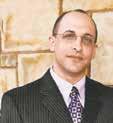





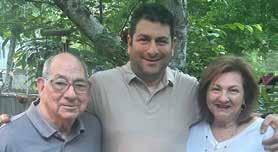



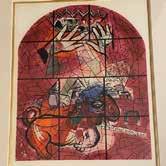
This Chagall lithograph depicts JUDAH, “THE KINGS”, one of the twelve tribes of Israel that are featured on Chagall’s twelve stained glass windows of the Jerusalem temple.The framed piece measures 34”x40” and carries the written title of authenticity and the letter of Tirage attached. All offers will be considered. Call or text Carlee at 404-558-0899.



































